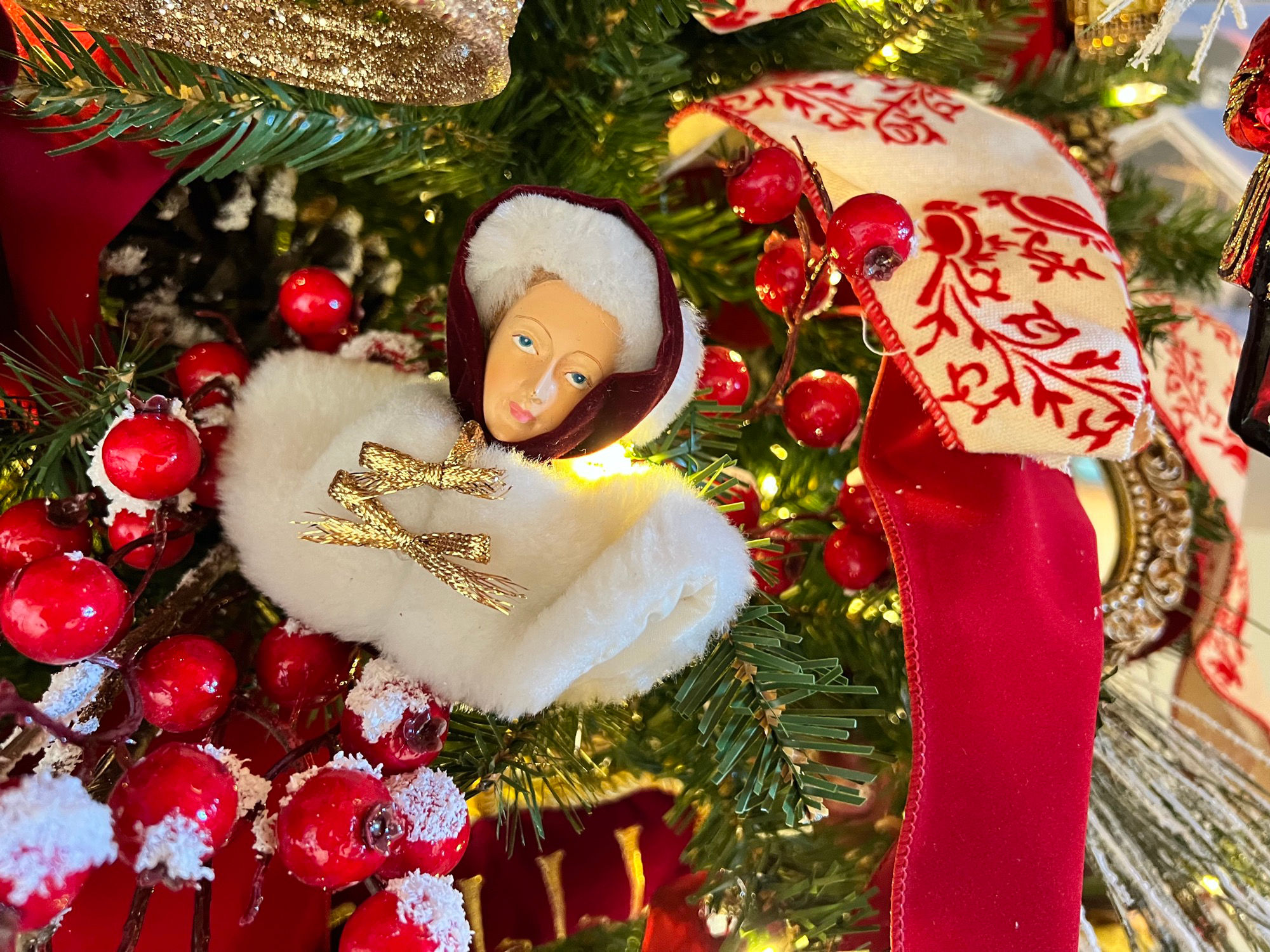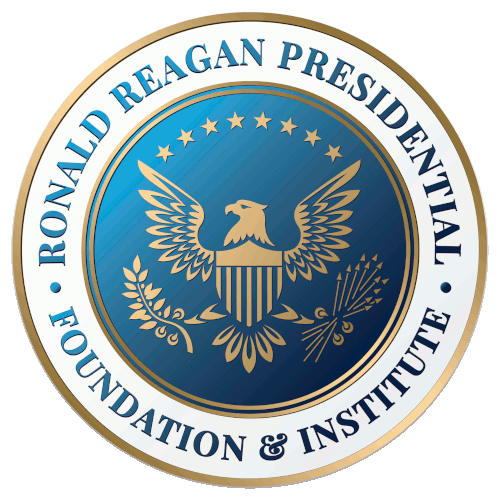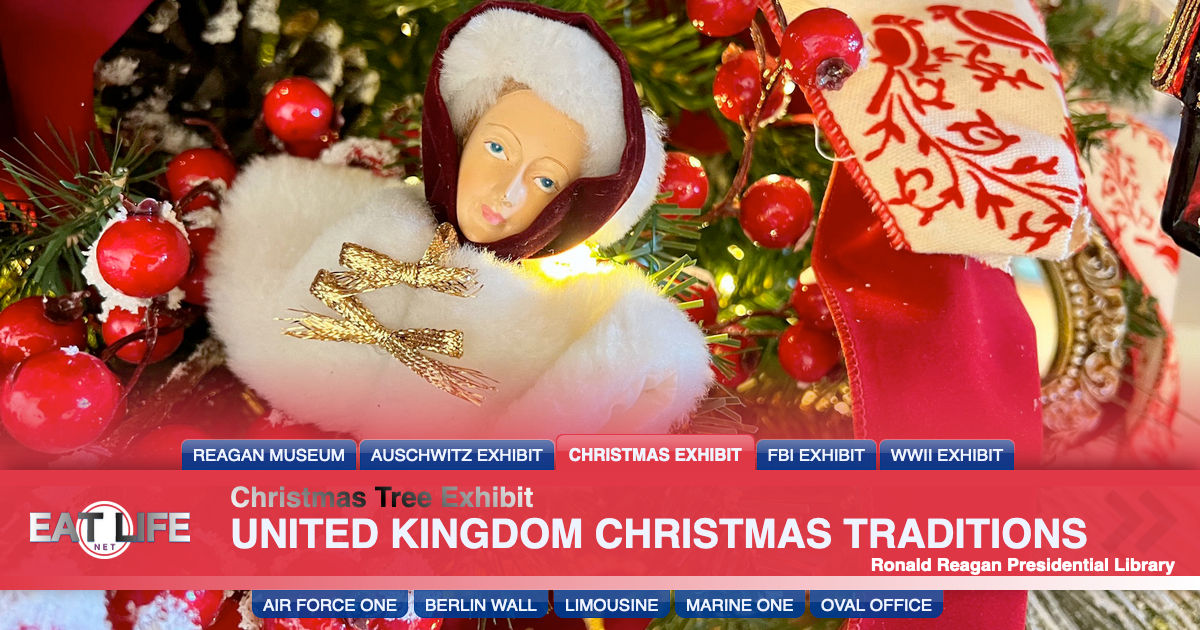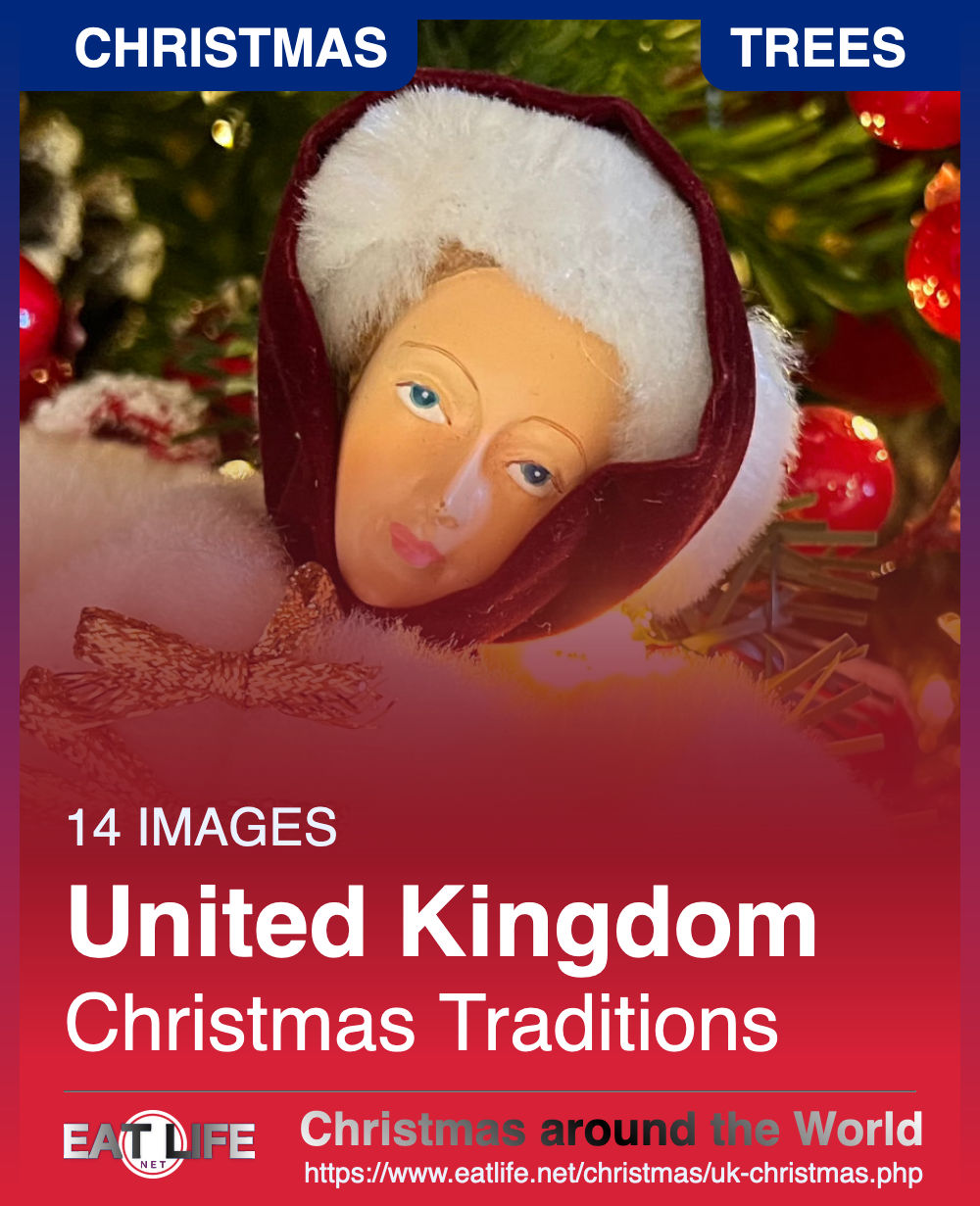BRITISH CHRISTMAS

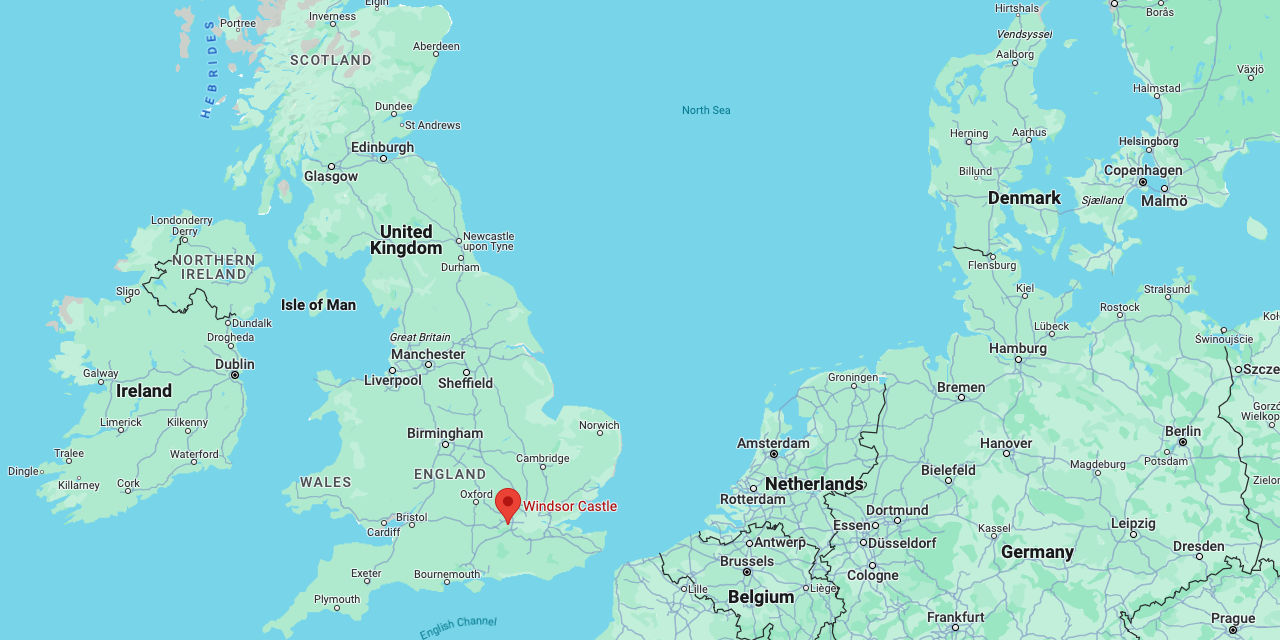
https://www.google.com/maps/place/Windsor+Castle
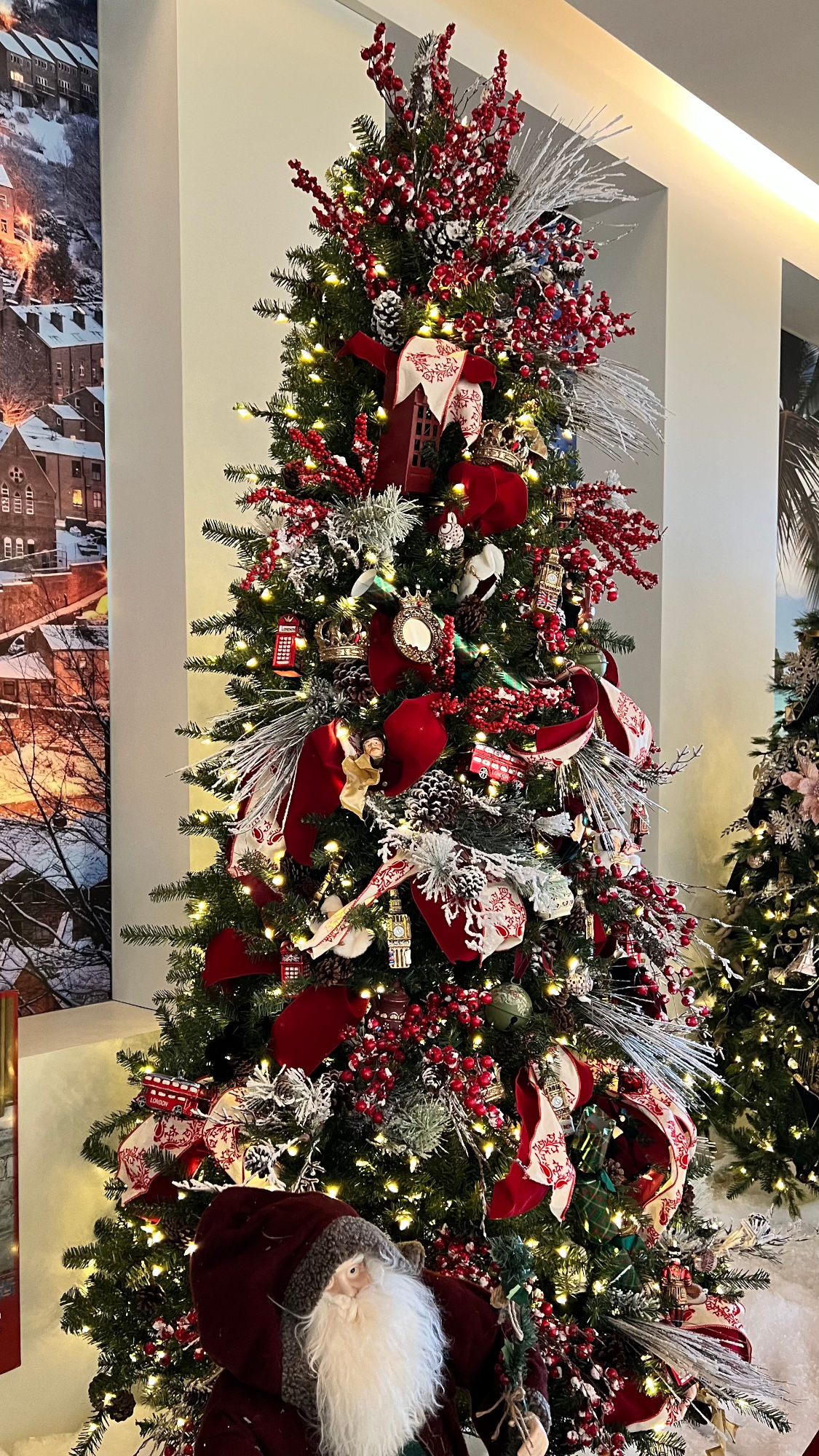
WHYCHRISTMAS.COMChristmas in the United Kingdom
In the UK (or Great Britain and Northern Ireland), families often celebrate Christmas together, so they can watch each other open their presents!
- Most families have a Christmas Tree (or maybe even two!) in their house for Christmas. The decorating of the tree is usually a family occasion, with everyone helping. Christmas Trees were first popularised the UK by Prince Albert, the husband of Queen Victoria. Prince Albert was German, and thought that it would be good to use one of his ways of celebrating Christmas in England.
- Holly, Ivy and Mistletoe are also sometimes used to decorate homes or other buildings.
- Most villages, towns and cities are decorated with Christmas lights over Christmas. Often a famous person switches them on. The most famous Christmas lights in the UK are in Oxford Street in London. Every year they get bigger and better. Thousands of people go to watch the big 'switch on' around the beginning of November.
- Like a lot of countries, Nativity Plays and Carol Services are also very popular at Christmas time. The Church that I go to always has a Carols by Candlelight Service where the church is only lit up by candles. It is a very special service and always makes me feel very Christmassy! Lots of other British churches also have Carols by Candlelight and Christingle services. The most famous UK Carol service is the Service of Nine Lessons and Carols which is broadcast on Christmas Eve at 3.00pm from the chapel of King's College, Cambridge.
- Children believe that Father Christmas or Santa Claus leaves presents in stockings or pillow-cases. These are normally hung up by the fire or by the children's beds on Christmas Eve. Children sometimes leave out mince pies and brandy for Father Christmas to eat and drink when he visits them. Now, it's often a non-alcoholic drink that's left because Santa has to drive his sleigh.
- Children write letters to Father Christmas/Santa listing their requests, but sometimes instead of putting them in the post, the letters are tossed into the fireplace. The draught carries the letters up the chimney and Father Christmas/Santa reads the smoke.
- There are some customs that only take place, or were started, in the UK. Wassailing is an old anglo-saxon custom that doesn't take place much today. Boxing Day is a very old custom that started in the UK and is now taken as a holiday in many countries around the world.
- In the UK, the main Christmas Meal is usually eaten at lunchtime or early afternoon on Christmas Day. It's normally roast turkey, roast vegetables and 'all the trimmings' which means vegetables like carrots & peas, stuffing and sometimes bacon and sausages. It's often served with cranberry sauce and bread sauce. Traditionally, and before turkey was available, roast beef or goose was the main Christmas meal. One vegetable that is often at Christmas in the UK are brussel sprouts. I love them but lots of people don't!
- Dessert is often Christmas Pudding. Mince pies and lots of chocolates are often eaten as well!
- Trifle is also a popular dessert at Christmas. It's made in a large bowl and consists of a layer of sponge cake (or sponge fingers) at the bottom of the bowl (which is often soaked in sherry or brandy) then there's a layer of fruit (normally suspended in a fruit flavored jelly) and it's topped with a layer of custard and then whipped cream. In Scotland there's a variation called 'Tipsy Laird' which uses whiskey to soak the sponge and the fruit are raspberries.
- The dinner table is decorated with a Christmas Cracker for each person and sometimes flowers and candles.
- The UK is also famous for Christmas Cake - some people love it and some people really don't like it! It's traditionally a rich fruit cake covered with marzipan and icing - and often top with Christmas themed cake decorations like a spring of holly.
At 3.00pm on Christmas Day, the Ryoal Christmas Message is broadcast on TV, radio and online in the UK. The tradition of a Royal Christmas Message started in 1932 by King George V. Queen Elizabeth II gave her first Christmas Message in 1952. It was first broadcast on TV in 1957. The speech is now prerecorded a few days before Christmas. It's actually broadcast first in New Zealand and Australia (at about 5am UK time) as they start Christmas Day earlier!
In North Derbyshire and South Yorkshire (in the north of England), some very special carol singing, called 'The Sheffield Carols', happens in some pubs during the weeks leading up to Christmas (the traditional day for sorting the carol singing is Armistice Sunday near the middle of November). The pubs are often rural and out on the hills in that part of England. The carols are often very local ones and the same carol often varies from pub to pub. Not all the carols are ones about the Christmas story. The pubs are often packed, especially the nearer it is to Christmas. The singing can be lead/accompanied by local folk musicians, an organ in the pub or sometimes the singing is unaccompanied.
In the UK, it doesn't snow very often, but people always want to know if it will be a 'White Christmas'. The British definition, used by the UK Meteorological Office (who say if it has been a White Christmas in the UK or not!), is that a single snow flake has been seen falling in the 24 hours of Christmas Day! This doesn't happen a lot in the UK!!!
Statistics show that in the UK, they get an official White Christmas about every 4 or 5 years and have real snow at Christmas about 1 in 10 years (but often this is only normally in Scotland!).
One sure way of getting some snow into Christmas in the UK is by watching the popular cartoon 'The Snowman' which is about a boy's adventure when his snowman comes to life. The animation was first shown on UK TV on Boxing Day in 1982. It's based on story book of the same name by the children's author and illustrator Raymond Briggs. For many families, it's now a 'must watch' over Christmas. (When I was at Primary/Elementary School in the 1980s, it was always shown to the school on the last morning before the Christmas holidays!) The Snowman also featured the song "Walking in the Air". In the animation, it was sung by Peter Auty, a choirboy at St Paul's Cathedral in London. However, the song became very famous in 1985 when it was used in a Christmas TV advert for the 'Toys "R" Us' chain in the UK. This time, it was sung by a choirboy called Aled Jones. Aled Jones is now an adult and is a TV and Radio presenter! The song has been recorded by lots of different people and groups (including an adult Aled singing a duet with his younger self) and is now a real UK 'Christmas classic'! In 2012 a sequel to The Snowman called "The Snowman and the Snowdog" was shown on Christmas Eve.
whychristmas.com
- In Scots (a Scottish dialect) Happy/Merry Christmas is Blithe Yule
- In Gaelic it's Nollaig Chridheil
- In Welsh (which is spoken in some parts of Wales it's Nadolig Llawen
- In Cornish (spoken by some people in Cornwall in south west England) it's Nadelik Lowen
- In Manx (spoken by some people on the Isle of Man) it's Nollick Ghennal
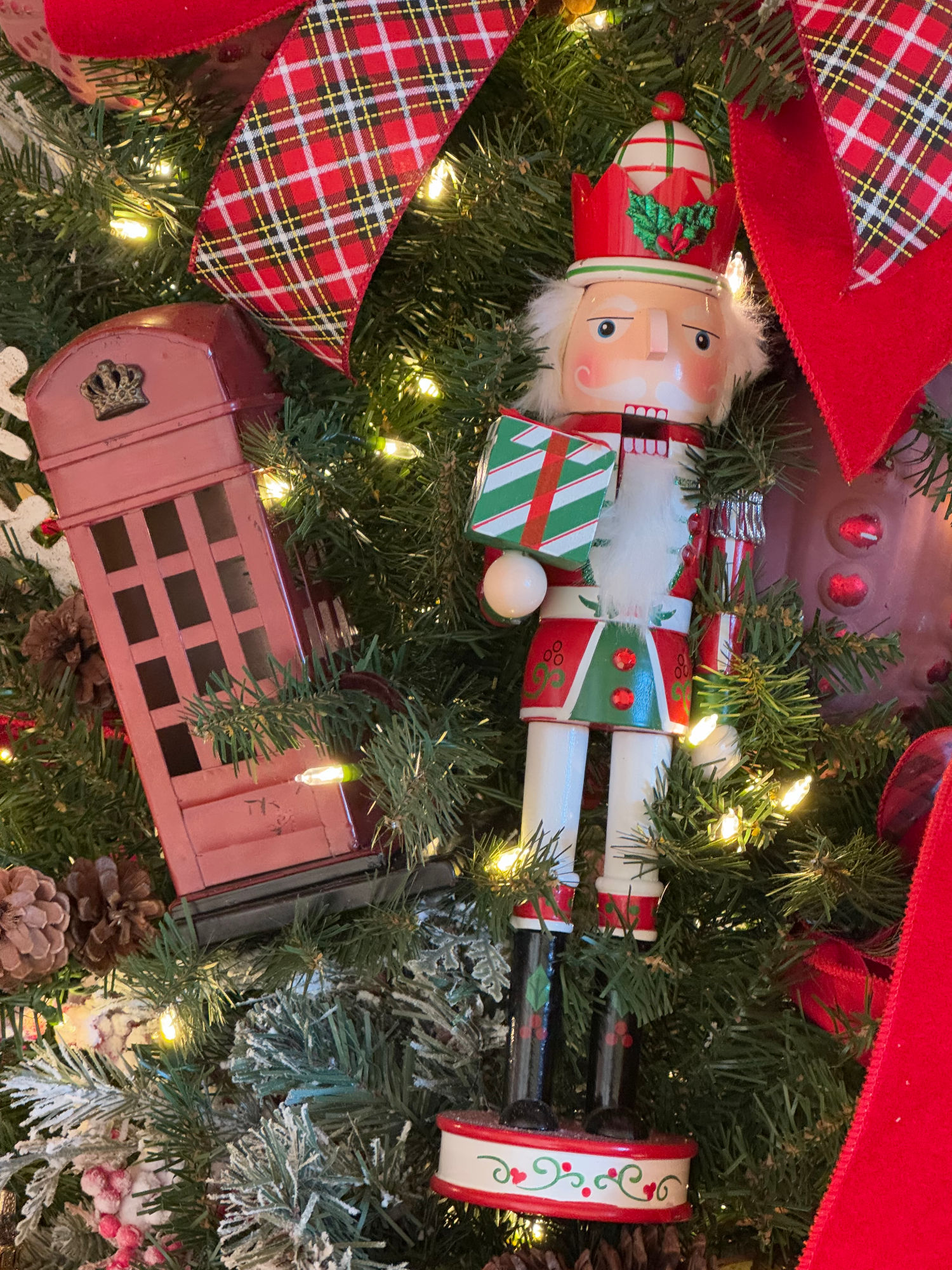
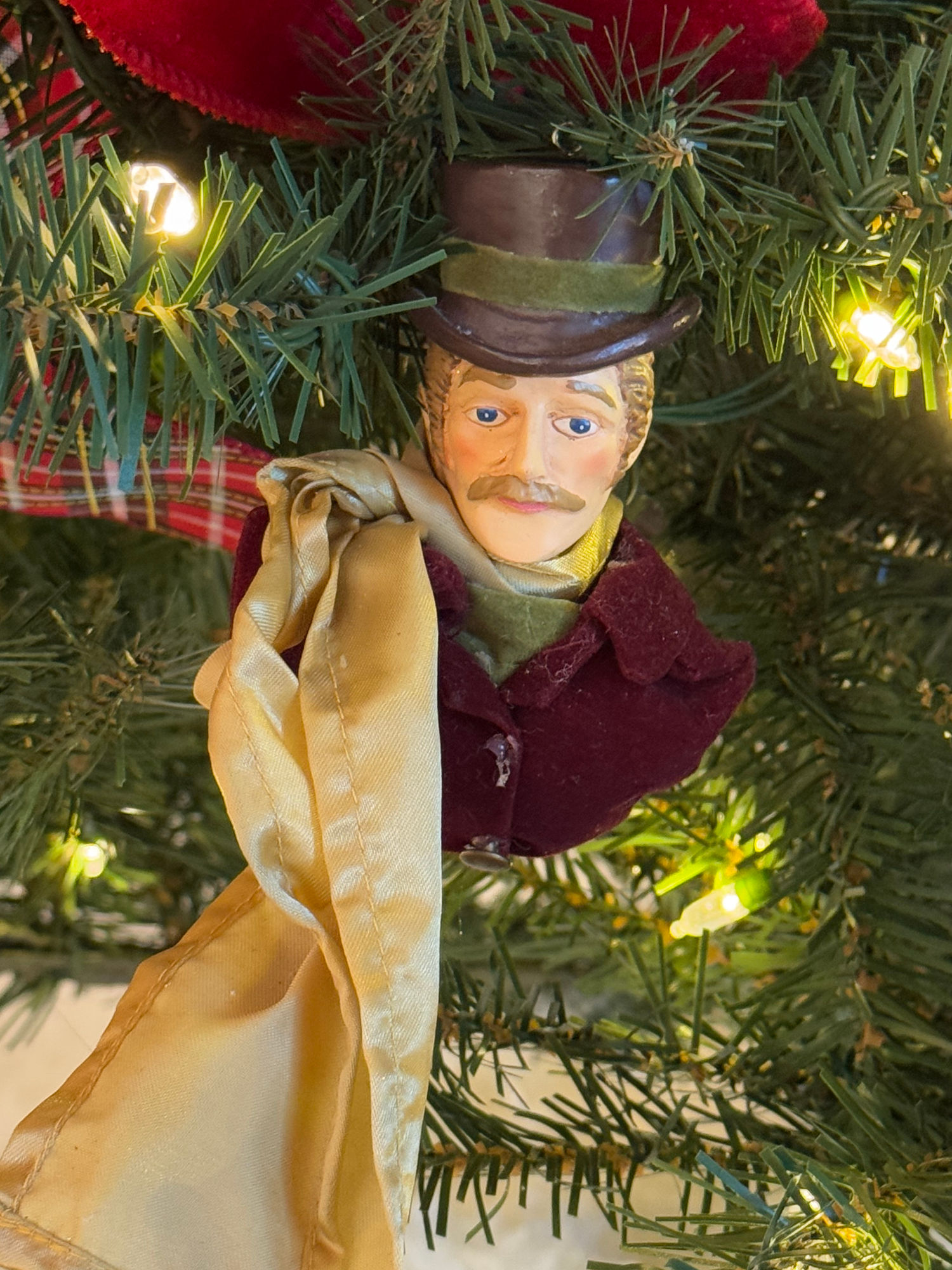
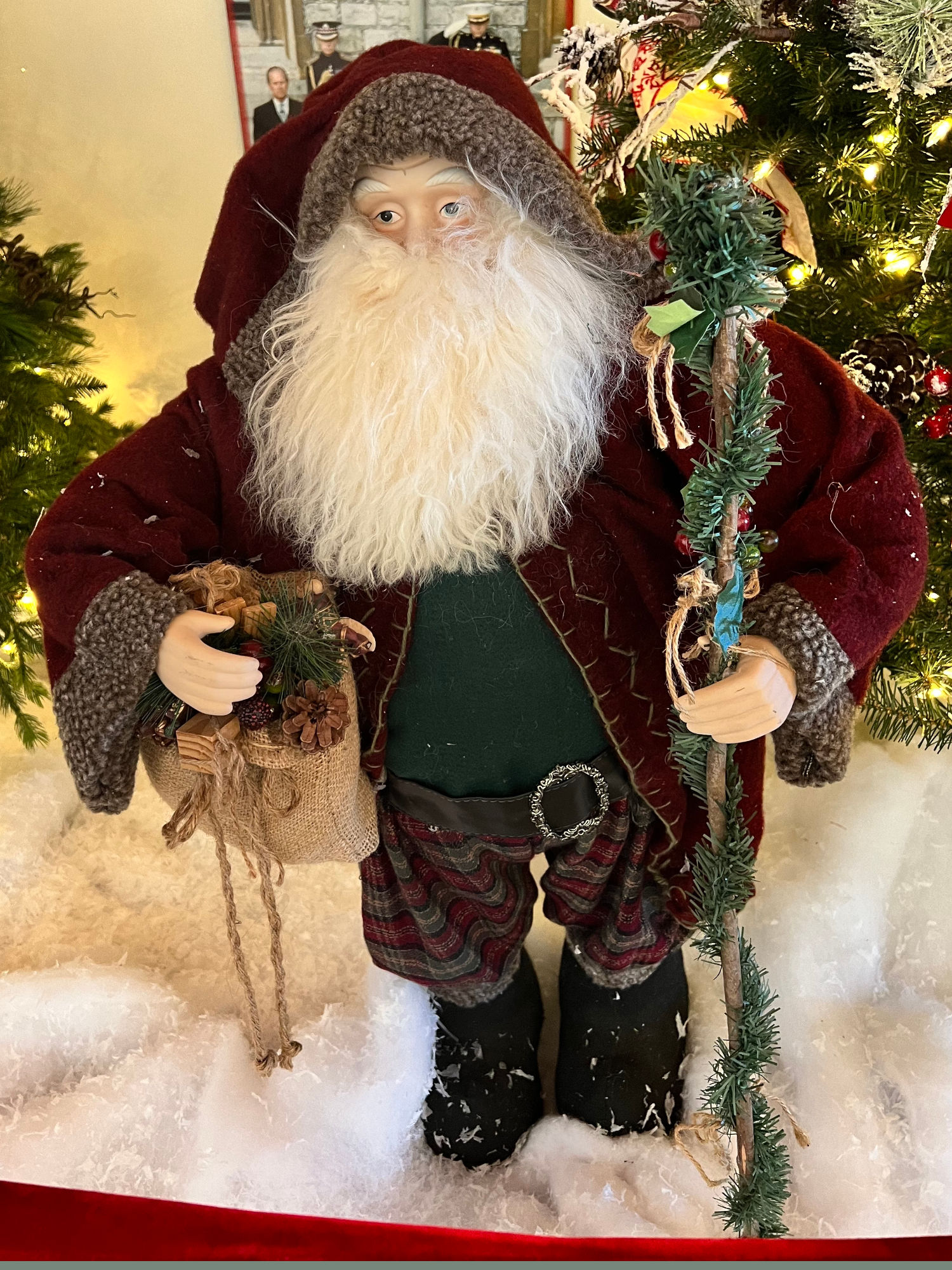
CULTURE TRIPEngland Christmas Markets
You don't have to visit Germany to experience traditional Bavarian festive markets; there is now a wide range of Christmas markets that pop up in towns all around the UK. People travel for miles to experience these festive fairs, which often draw in huge crowds in the lead up to Christmas. These are the very best Christmas markets in England to get you into the holiday spirit.England's Largest German Market in Birmingham
The Frankfurt Christmas Market in Birmingham is the largest German market outside of the country itself with over 200 traditional stalls selling everything from trinkets to gluhwein (mulled wine). The heart of the market is situated in Victoria Square with a cosy, wintery village complete with warming food (such as pretzels, schnitzel and roasted nuts) and drink, fairground attractions for children and plenty of seating so you can sit and soak up the festive atmosphere. Nearby on Chamberlain Square, you will find more tasty treats alongside a variety of handmade crafts, perfect for gifts.Themed Christmas Markets in Manchester
Manchester's Christmas markets bring visitors from around the globe to the city throughout November and December. The main hub is the German market on Albert Square where many traditional stalls sell handmade gifts and decorations – don't leave without trying one of its frankfurter sausages. Other markets are scattered around the city centre, from Spinningfields to Cathedral Gardens, offering festive wares from other European locations alongside local handicrafts. With hundreds of stalls, Manchester's assortment of Christmas markets is the perfect place to find a gift for even the most discerning of recipients.Truly English Christmas Market in York
If you want to visit a picturesque festive market that's more Olde Worlde England than German, head to York. Every winter, the St Nicholas Fair takes over Parliament Street, St Sampson's Square and Coppergate, with stalls spilling onto Shambles. This quaint market mainly offers locally produced gifts such as crafts and edible treats, maintaining a strong Yorkshire theme throughout. The market is the perfect destination for visitors to the UK who want to see a traditional English Christmas market; a day wandering through these charming stalls would melt the heart of Scrooge himself.London's Stylish Christmas Markets
You won't struggle to find a wonderfully festive market in London, with an abundance of large and small markets scattered across the capital. Hyde Park's ostentatious Winter Wonderland is obviously the jewel of the crown, offering plenty of entertainment and food stalls for the whole family to enjoy. But if you want to avoid the hectic crowds and wander further afield, you'll discover gatherings of old-fashioned wooden stalls in every neighbourhood. London's vast number of Christmas markets offer everything you could need to enjoy the season, from food markets in Kings Cross Square to the Southbank Centre's traditional Christmas market.Bath Christmas Market
Boasting an impressive array of handmade goods that are predominantly made in the local area, Bath hosts one of the most popular festive markets in the country. Over 150 stalls line the streets around the Roman Baths, selling everything from seasonal food and drink to local crafts, fashion and ceramics. With one-of-a-kind items of all sorts, the Bath Christmas Market is the place to pick up that special holiday gift.Lincoln's Festive Fair
Make sure you don't miss Lincoln's festive market, which is as fleeting and magical as Christmas itself. It may be one of the most short-lived festive markets in the country, with the stalls only appearing for four days around the holidays (in 2021, it's on from 2-5 December), but its reputation indicates that it's also one of the best. Based around Norman Square, 250 stalls spring up overnight offering food, drink and gifts galore. Alongside the wooden huts, there's plenty of entertainment, including a Ferris wheel and live music.
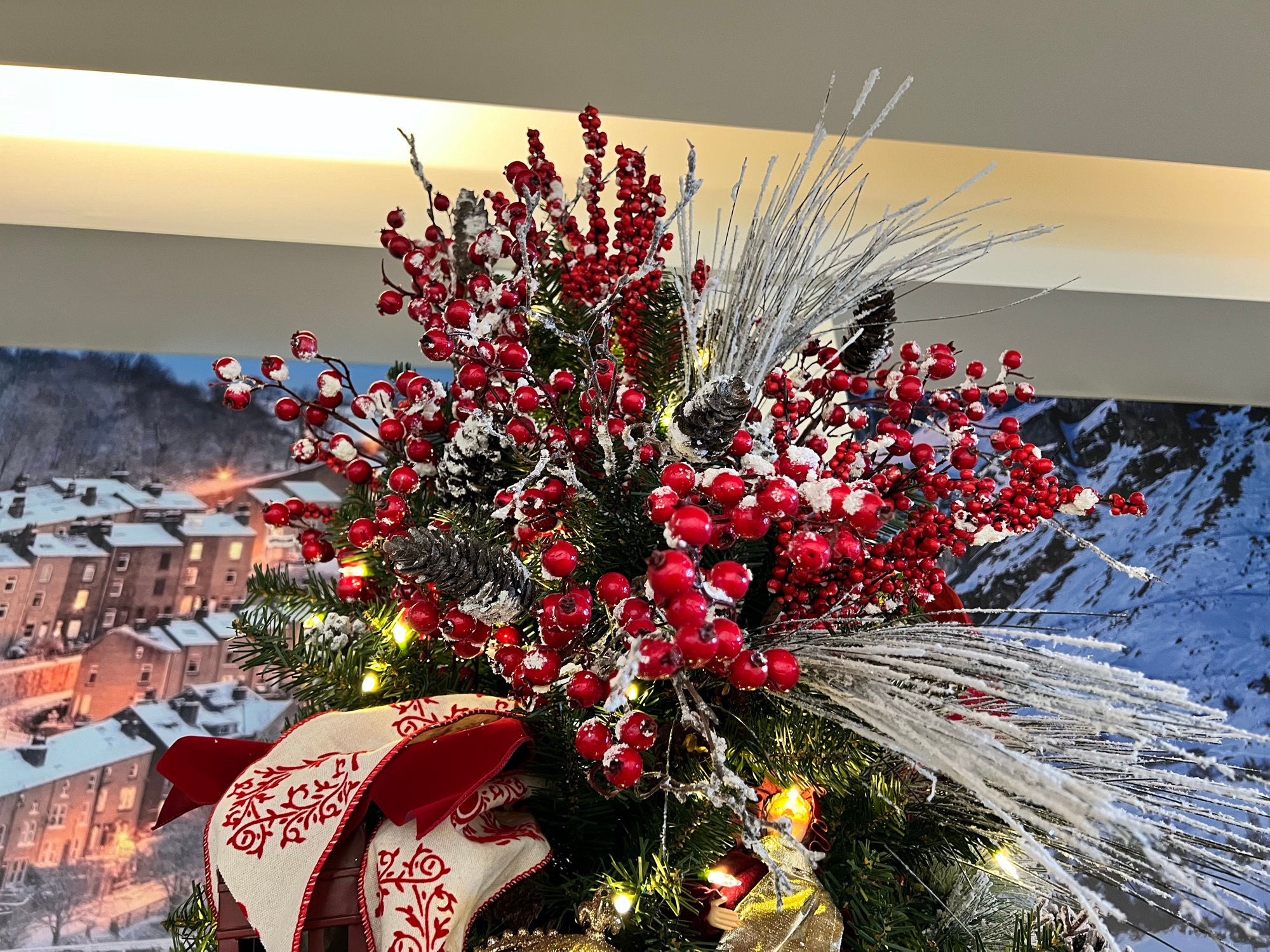
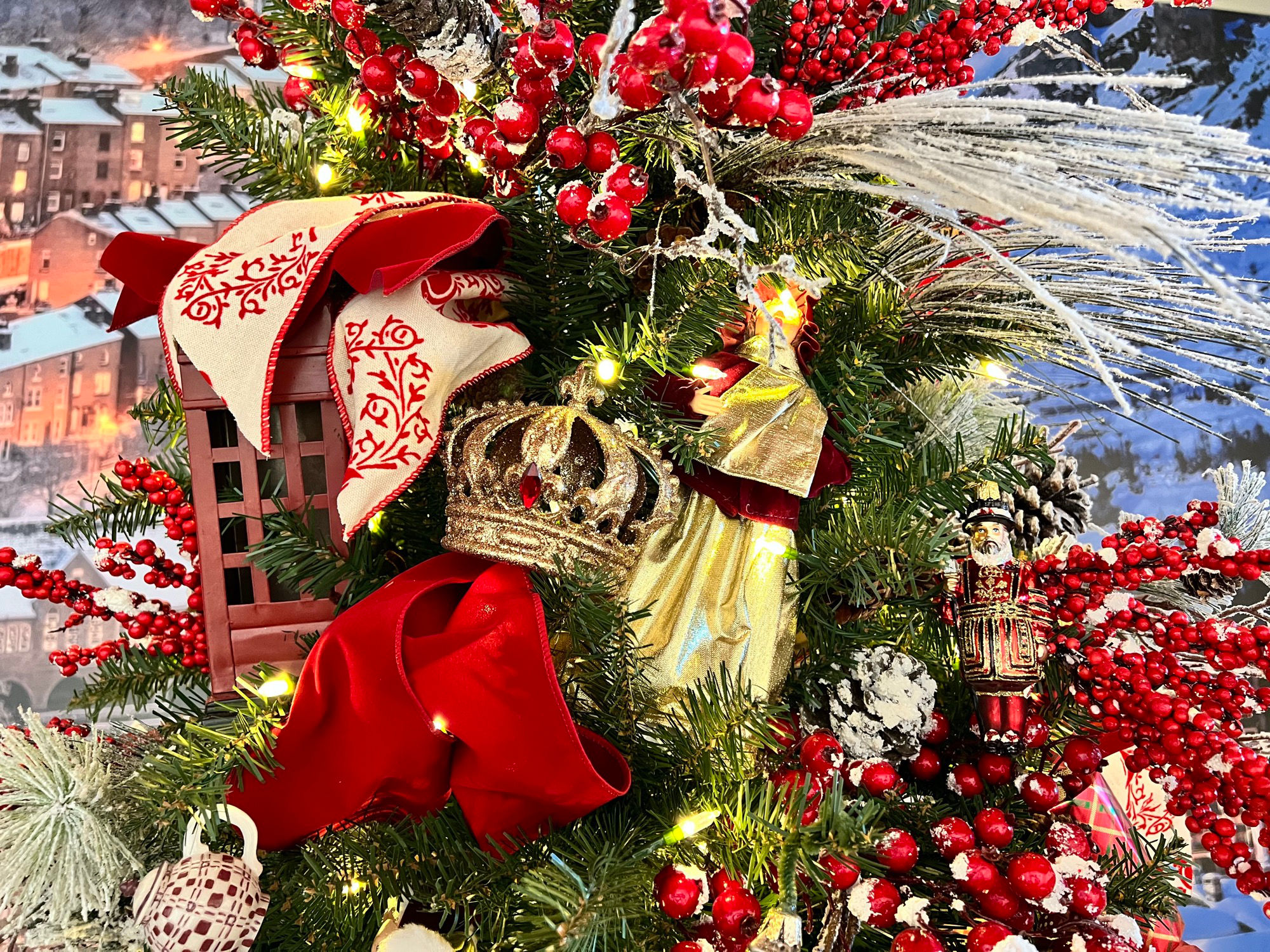
WORLD HOLIDAY TRADITIONSHoliday Traditions of England
Christmas is Britain's most popular holiday and is characterized by traditions which date back hundreds of years. Many Christmas customs which originated in Britain have been adopted in the United States.The first ever Christmas card was posted in England in the 1840s, and the practice soon became an established part of the build-up to Christmas. Over a billion Christmas cards are now sent every year in the United Kingdom, many of them sold in aid of charities.
Christmas decorations in general have even earlier origins. Holly, ivy and mistletoe are associated with rituals going back beyond the Dark Ages. (The custom of kissing beneath a sprig of mistletoe is derived from an ancient pagan tradition.) The Christmas tree was popularized by Prince Albert, husband of Queen Victoria, who introduced one to the Royal Household in 1840. Since 1947, the country of Norway has presented Britain annually with a large Christmas tree which stands in Trafalgar Square in commemoration of Anglo-Norwegian cooperation during the Second World War.
Popular among children at Christmas time are pantomimes: song and dance dramatizations of well-known fairy tales which encourage audience participation.
Carols are often sung on Christmas Eve by groups of singers to their neighbors, and children hang a stocking on the fireplace or at the foot of their bed for Santa Claus (also named Father Christmas) to fill. Presents for the family are placed beneath the Christmas tree.
Christmas Day sees the opening of presents and many families attend Christmas services at church. Christmas dinner consists traditionally of a roast turkey, goose or chicken with stuffing and roast potatoes. This is followed by mince pies and Christmas pudding flaming with brandy, which might contain coins or lucky charms for children. (The pudding is usually prepared weeks beforehand and is customarily stirred by each member of the family as a wish is made.) Later in the day, a Christmas cake may be served - a rich baked fruit cake with marzipan, icing and sugar frosting.
The pulling of Christmas crackers often accompanies food on Christmas Day. Invented by a London baker in 1846, a cracker is a brightly colored paper tube, twisted at both ends, which contains a party hat, riddle and toy or other trinket. When it is pulled by two people it gives out a crack as its contents are dispersed.
Another traditional feature of Christmas afternoon is the Queen's Christmas Message to the nation, broadcast on radio and television.
The day after Christmas is known in Britain as Boxing Day, which takes its name from a former custom of giving a Christmas Box - a gift of money or food inside a box - to the deliverymen and tradespeople who called regularly during the year. This tradition survives in the custom of tipping the milkman, postman, dustmen and other callers of good service at Christmas time.
Of Special Note...
MISTLETOE, considered sacred by the British Druids, was believed to have many miraculous powers. Among the Romans, it was symbol of peace, and, it was said that when enemies met under it, they discarded their arms and declared a truce. From this comes our custom of kissing under the mistletoe. England was the first country to use it during the Christmas season.
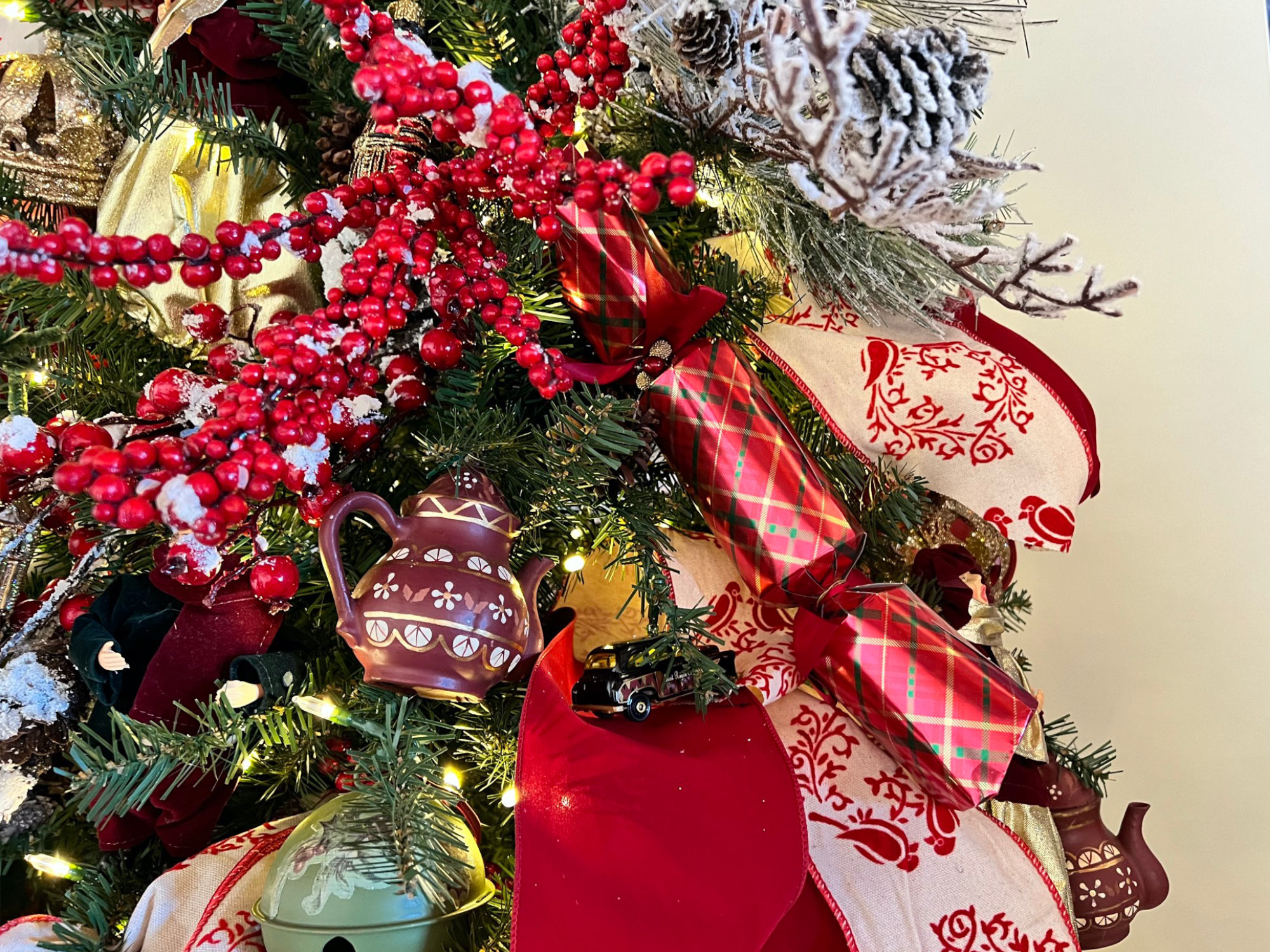
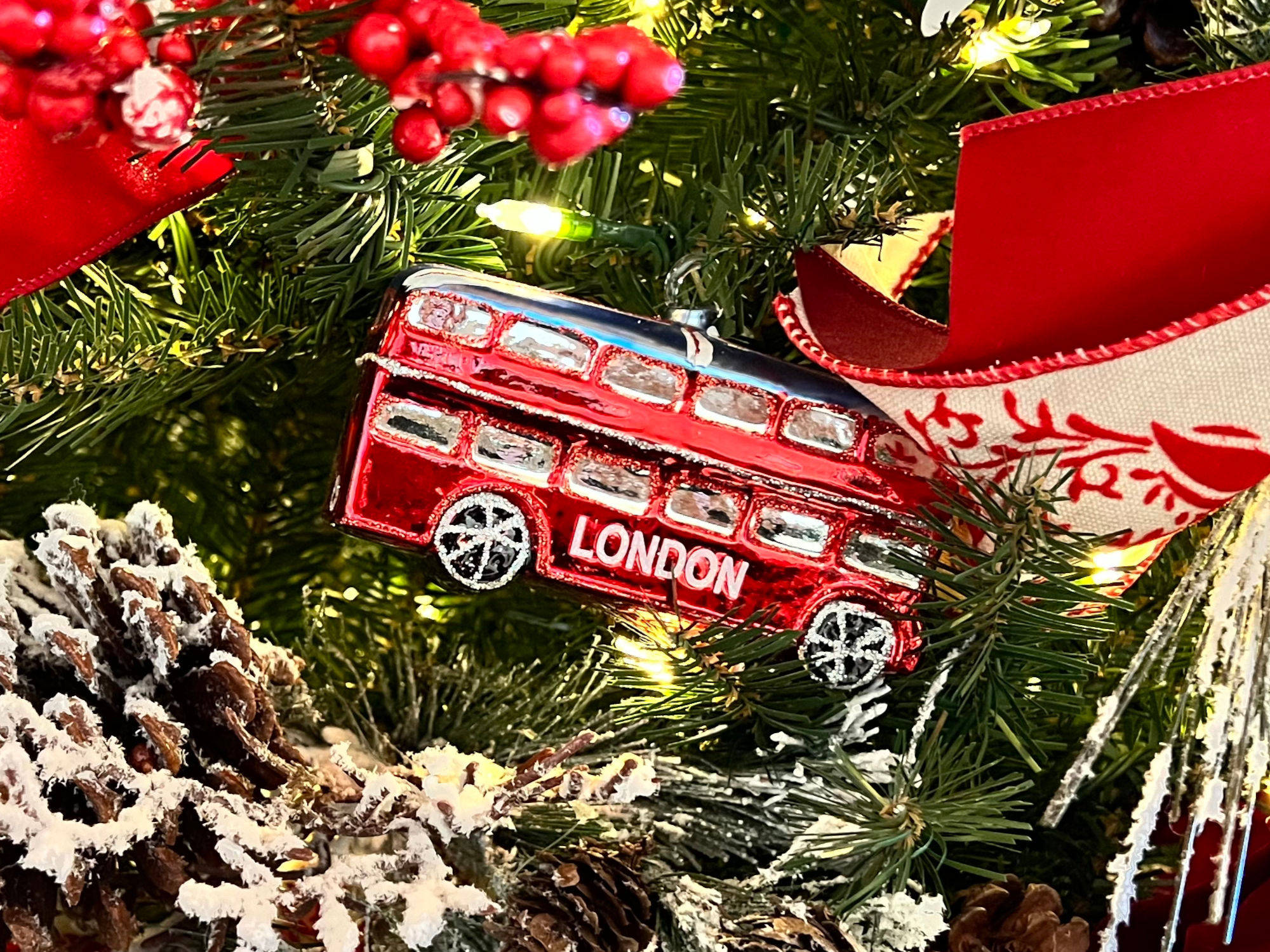
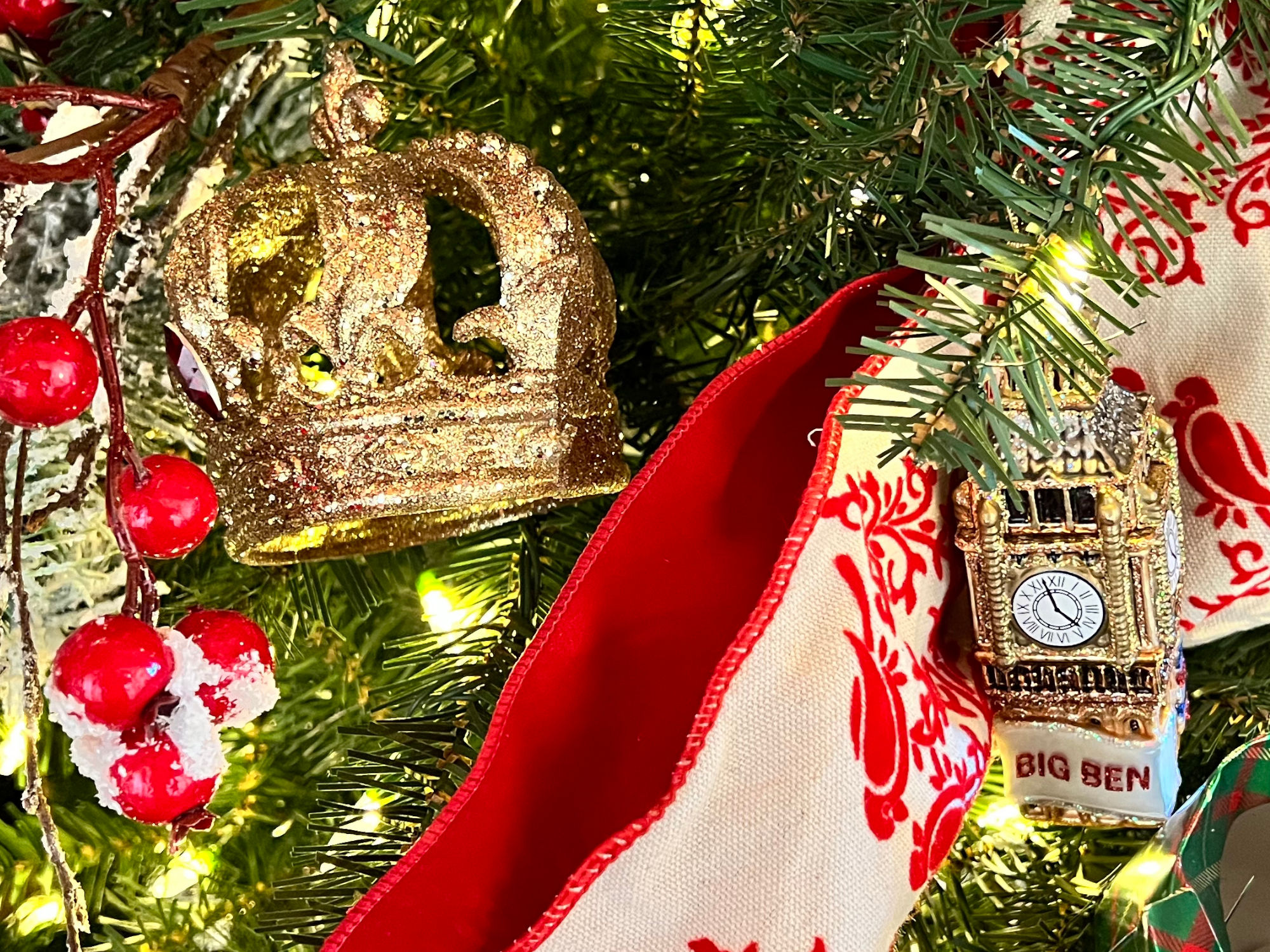
HOW STUFF WORKSChristmas Traditions in England
It is cold, wet, and foggy in England at Christmastime. Families welcome the warmth and cheer of a Yule log blazing on the hearth. They decorate their homes with holly, ivy, and other evergreens and hang a mistletoe "kissing bough."Throughout the holidays, carolers go from house to house at twilight ringing handbells and singing Christmas songs. "The Holly and the Ivy" and "Hark! The Herald Angels Sing" are English favorites. People give the carolers treats, such as little pies filled with nuts and dried fruits.
The day before Christmas is very busy for families in England. They wrap presents, bake cookies, and hang stockings over the fireplace. Then everyone gathers around the tree as someone tells the favorite story, "A Christmas Carol."
After hearing their favorite Christmas story, children write a letter to Father Christmas with their wishes. They toss their letter into the fire so their wishes can go up the chimney. After the children fall asleep on Christmas Eve, Father Christmas comes to visit. He wears a long, red robe, carries a sack of toys, and arrives on his sleigh pulled by reindeer. He fills the children's stockings with candies and small toys.
On Christmas Day, everyone sits down to the midday feast and finds a colorful Christmas cracker beside their dinner plate. A Christmas cracker is a paper-covered tube. When the end tabs are pulled, there is a loud crack. Out spills a paper hat to wear at dinner, small trinkets, and a riddle to read aloud to everyone at the table.
The family enjoys a feast of turkey with chestnut stuffing, roast goose with currants, or roast beef and Yorkshire pudding. Brussels sprouts are likely to be the vegetables. Best of all is the plum pudding topped with a sprig of holly. Brandy is poured over the plum pudding and set aflame. Then family members enjoy a dramatic show as it is carried into the dining room. Whoever finds the silver charm baked in their serving has good luck the following year. The wassail bowl, brimming with hot, spiced wine, tops off the day's feast. It is said that all quarrels stop when people drink wassail.
After dinner, the family gathers in the living room to listen to the Queen of England deliver a message over radio and television. At teatime in the late afternoon, the beautifully decorated Christmas cake is served.
The day after Christmas is called Boxing Day. This day has nothing to do with fighting. Long ago, people filled church alms boxes with donations for the poor. Then on December 26, the boxes were distributed. Now people often use this day to give small gifts of money to the mail carrier, news vendor, and others who have helped them during the year.
Beginning on Boxing Day, families can enjoy stage performances called pantomimes. This activity originally meant a play without words, or actors who mimed or entertained without speaking. Pantomime now refers to all kinds of plays performed during the Christmas season. Such familiar children's stories as "Cinderella" and "Peter Pan" delight young and old alike. In some towns, masked and costumed performers called mummers present plays or sing carols in the streets.
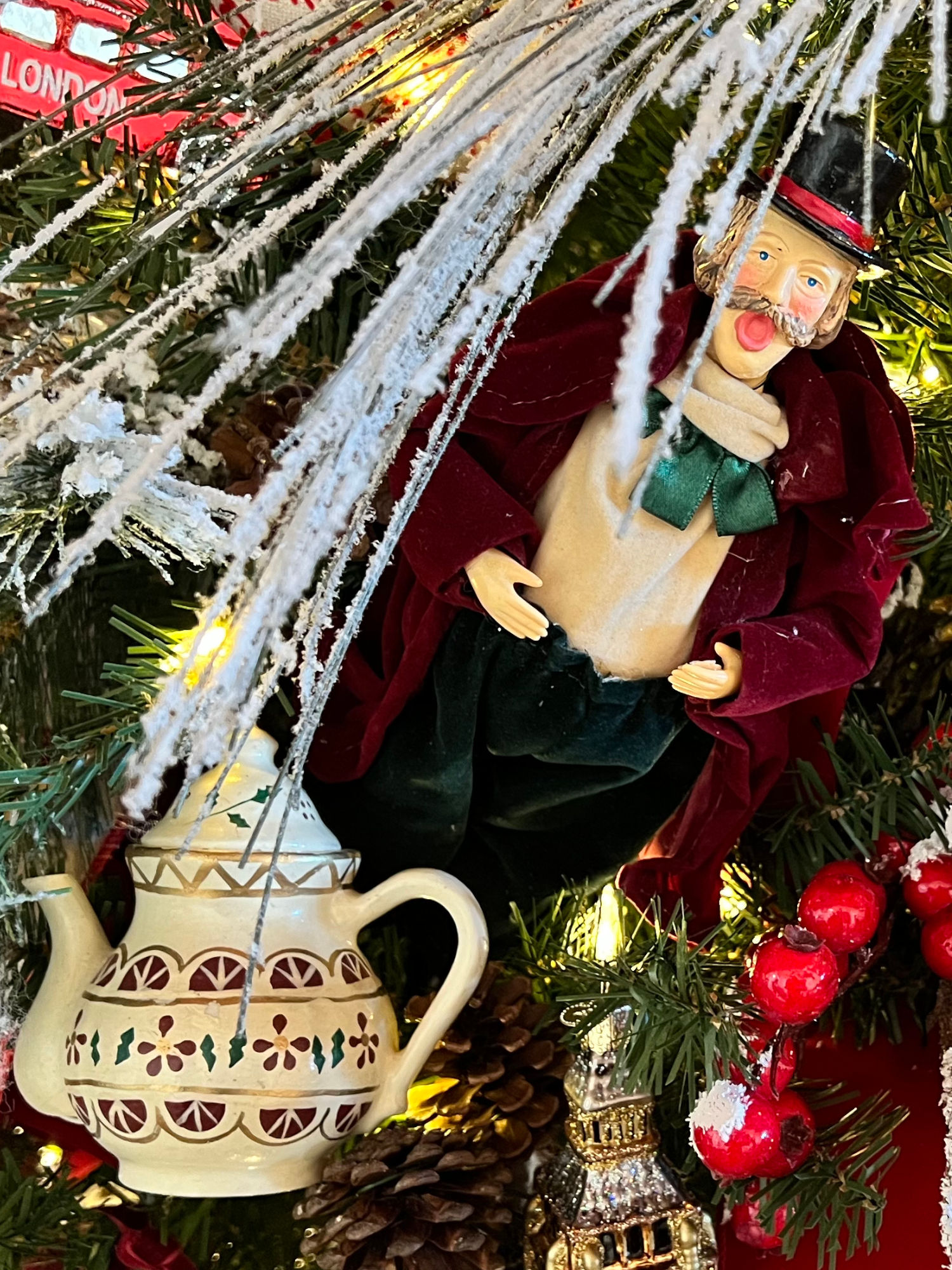
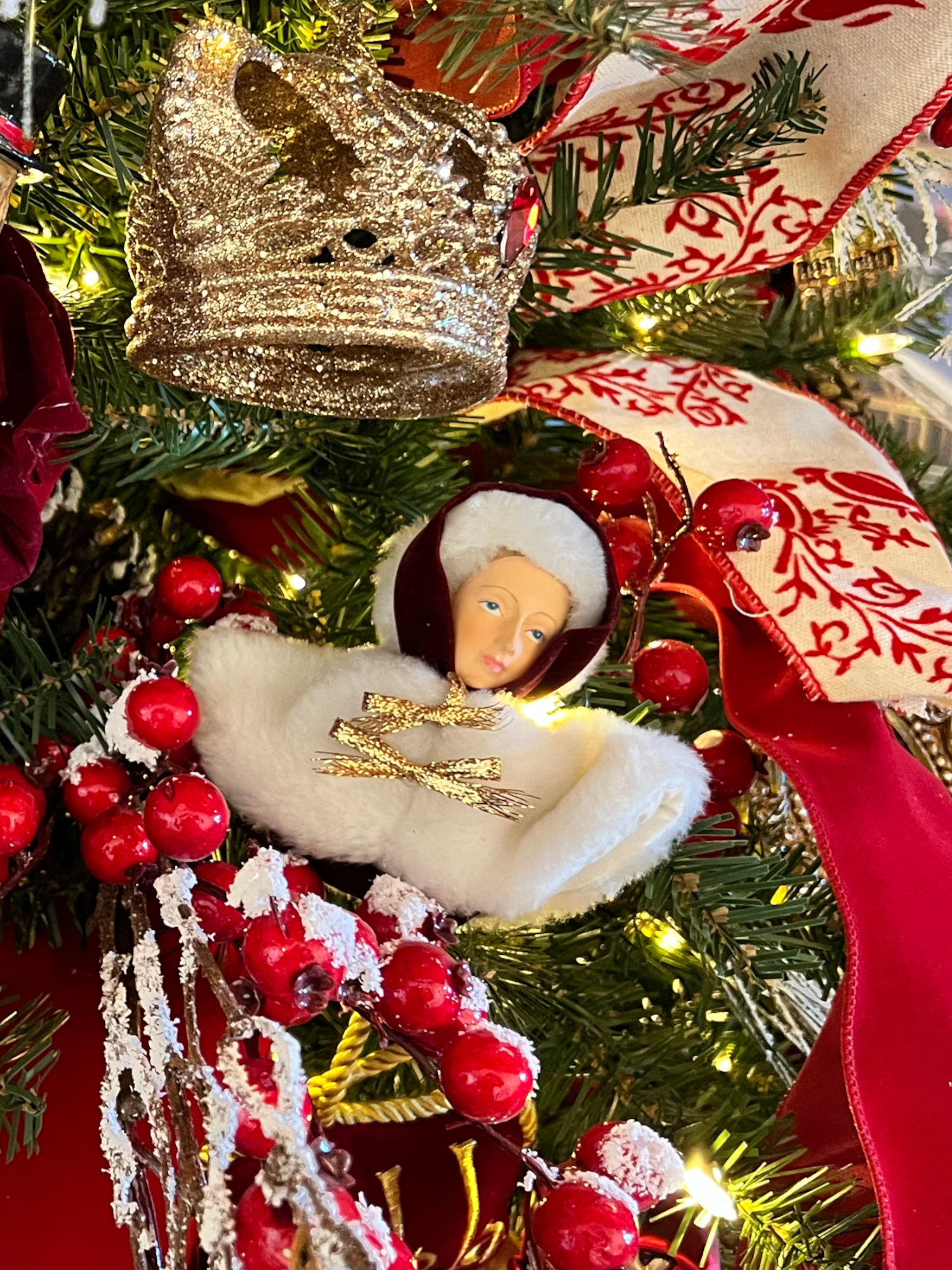
CULTURE TRIPChristmas Lights in London
For many Londoners, turning on the Christmas lights in the capital marks the beginning of the festive season. Across the city, creative light displays add a touch of magic to winter evenings. Here's our guide to the top London lights.Covent Garden
Being one of London's most popular shopping destinations, there's no surprise the sheer amount of detail that goes into decorating the famous market during the winter months. The sparkling festive lights reflecting on Covent Garden's cobbled streets give the area a truly magical feel. Decorations and lights also run through the shopping arcades, making it the perfect setting to indulge in some Christmas shopping.Regent Street
Allegedly the largest light installation in London, every year festive lights illuminate the long shopping stretch. In recent years, dazzling angel lights have been chosen to line the streets and, much like Oxford Street, celebrities and performers switch on the annual lights to mark the beginning of the festive season on Regent Street.Oxford Street
Probably the most famous in the capital, the Oxford Street lights never fail to impress eager shoppers. Every year they are usually in collaboration with a movie or a charity and are turned on by A-listers to kick off the holiday season. The legendary lights stretch across the whole of Oxford Street and add a touch of sparkle to a late-night Christmas shopping session.Bond Street
It's no surprise that the lavish shopping district has opulent festive lights to match. In 2017, it was reported that over £1 million were spent on the area's festive lights, with over a quarter of a million individual lights making up the extravagant peacock feathers.Carnaby Street
The stylish shopping area, located just seconds away from Oxford Street, is absolutely buzzing during the festive season. The lights on Carnaby Street always have an original and quirky feel to them and every year people flock by the thousands to watch them being switched on.South Molton Street
This pedestrian-only road just off Bond Street tube station is well-known for its luxury boutiques and shops. In 2017, the sparkling blue arches made the perfect setting for busy Christmas shoppers to walk through.Burlington Arcade
The extravagant shopping arcade in Mayfair is one of longest in Britain, boasting a whole selection of luxurious shops. It's no surprise, then, that the Christmas lights in this shopping district are always sophisticated and tasteful.
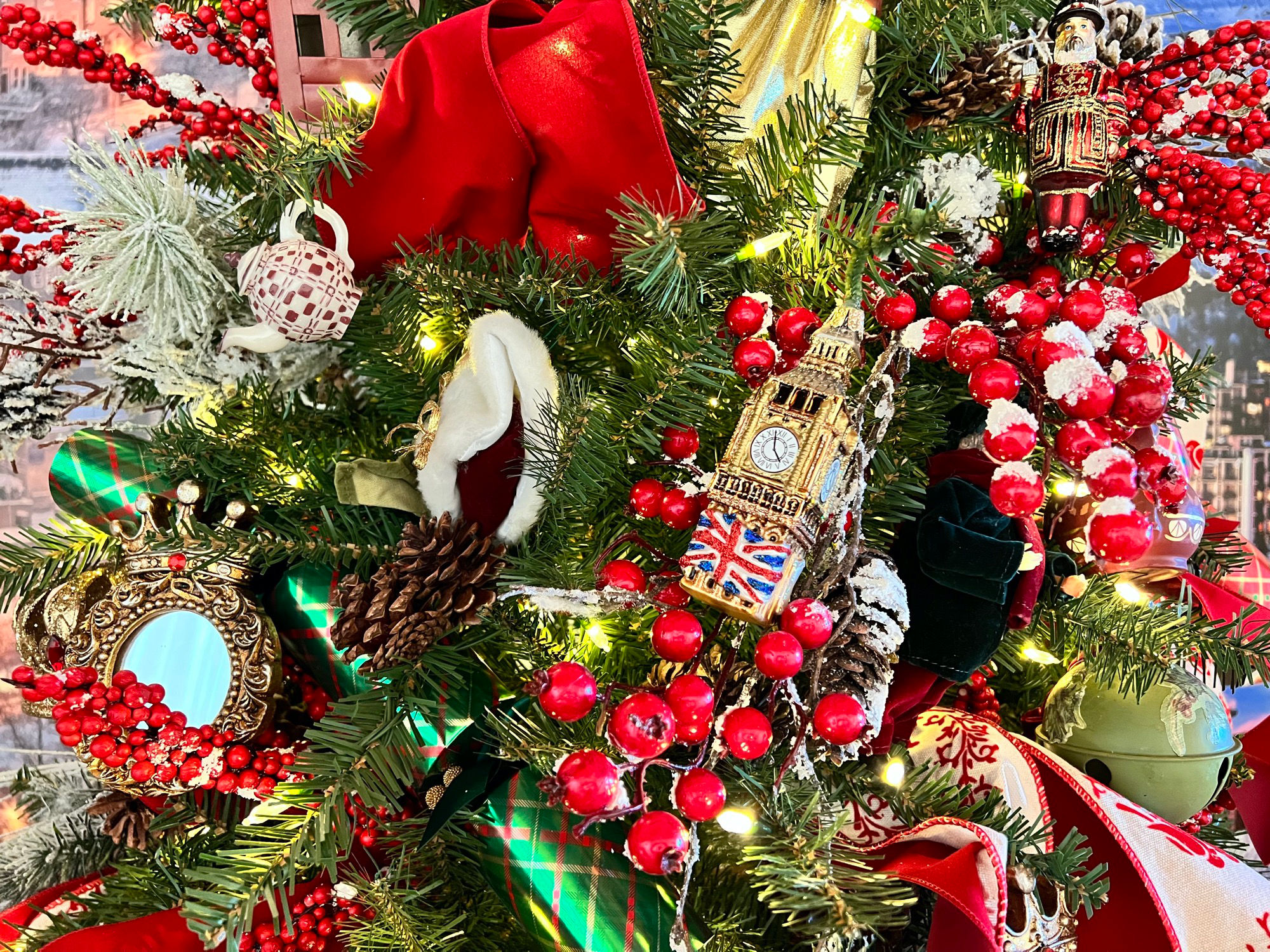
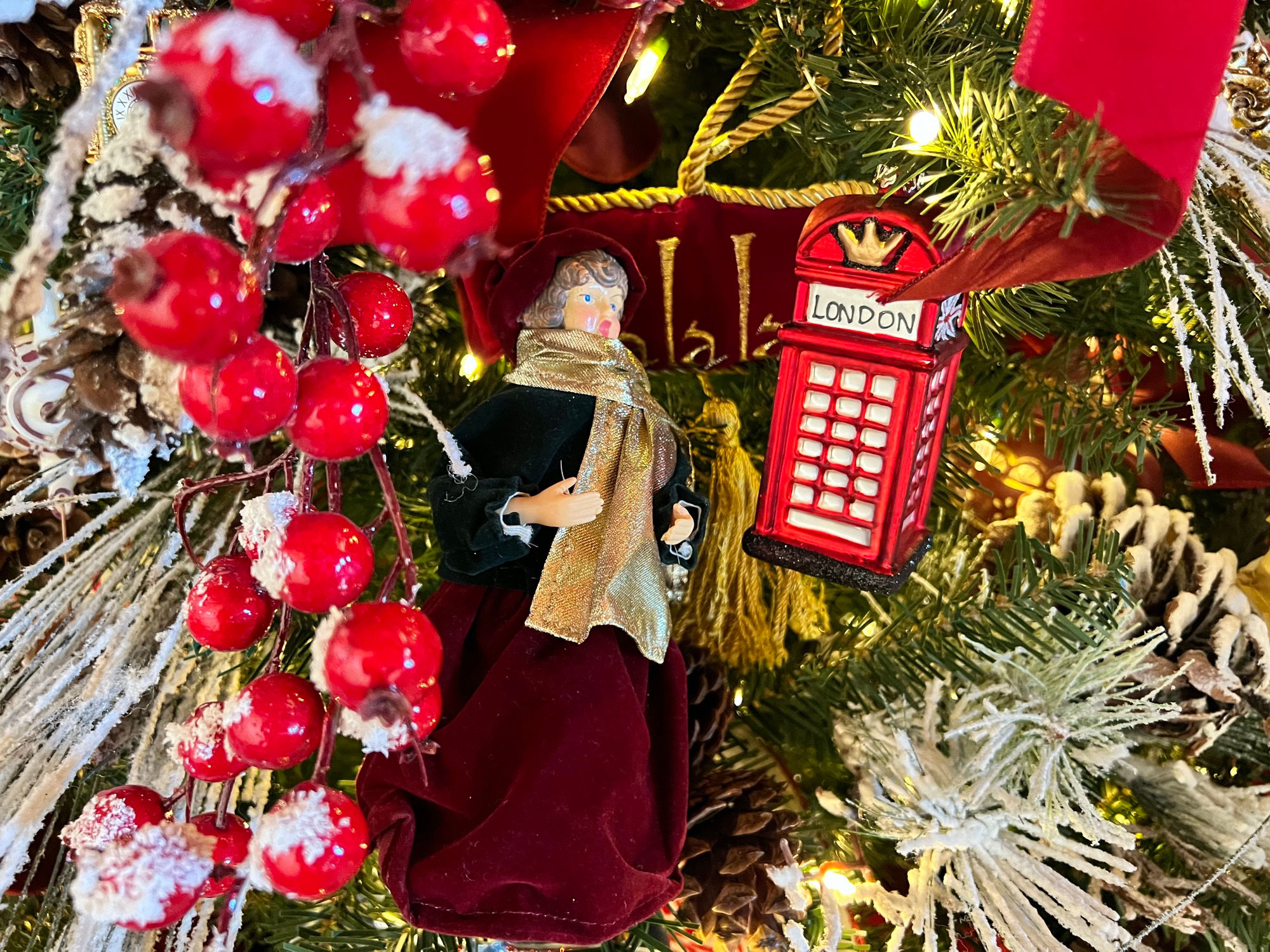
CHEF'S PENCILChristmas Dinner in England
Come the end of October, the shops begin filling up with just about everything wrapped up as Christmas fayre: biscuits, chocolates, donuts, cheese crackers, nuts, and dates – it is all given a festive feel and the shopping starts early.This is probably the most food-centered holiday of them all in good old Blighty, and we go to town. Larders are stocked, freezers are stuffed, and drinks cupboards are refilled – constantly as the festive season approaches. Christmas eve, Christmas day, Boxing Day, and any weekend on either side are crammed full of gastronomic delights.
But it is the Xmas dinner that is the celebratory feast of the year, the pride of the house, talked about in pubs and cafes and workplaces before the meal, as plans are devised, and after, as the culinary successes and disasters are shared in a post-Christmas appraisal.
Each to their own, as they say over here. And that applies to the main feast as every household has their own favorite veggies, sauces, or sides and preferred methods of cooking the gravy, the turkey, and the pud. But there are some essential components that go to make up the perfect English Christmas table.
The Turkey
This has been the prized centerpiece of Christmas dinner since the 16th century, when Henry VIII ordered it for the meal, making it instantly popular. "If it's good enough for royalty, it's good enough for us" is the old adage that also made the full English breakfast the iconic meal that it is – those lords and ladies certainly loved to feast, and the commoners knew themselves to be equally worthy. But the turkey remained a luxury good until way into the 19th century, which is why Charles Dickens had Scrooge bring the impoverished Cratchits a turkey to replace their lowly goose.Today, it is found on every table that isn't vegetarian or vegan or determined to buck the populist trend. And it is the most talked-about feature of the Xmas-meal conversation: Fresh or frozen? Farm or supermarket? Whole bird or crown? And that's just for sourcing the bird. Some families have their own tradition of visiting a local farm, "We've been going to Gobble Farm for our turkey for years!", to pick out the one they fancy.
The Stuffing
Chestnut. Highly popular with turkey, and rightly so, sweet chestnut has a long tradition... or does it? Originally thought to have been brought over by the Romans, more recent research says the oldest sweet chestnut tree in the country is only 381 years old. The Romans left 1,611 years ago. However it got here, we are happy it did because nothing goes with a succulent turkey quite like a sweet chestnut stuffing... except apricot and almond, or fig and walnut, oyster and bacon, or a very simple sage and onion – because let's face it, the bird is big enough for two.The Christmas Sides
It is not unusual across the fair British Isles to have two meats on the plate at Christmas – turkey, and pork. In England, that combination is represented by pigs in blankets, or pork sausages wrapped in bacon. They are quintessentially English. Also very common is a side of Yorkshire pudding – a batter tipped into hot oil and baked. It is crispy and light and delicious. It was originally devised as a way of filling up bellies in the absence of meat. But that doesn't stop it remaining a firm favorite.The Veggies
Here we come to household favorites. Many homes will serve up the same vegetables year after year – it isn't Christmas without spiced red cabbage, after all. But there are some that are particularly popular.
- Roast potatoes, roasted in goose fat or lard
- Roast parsnips, delicious even when overdone and chewy as toffee
- Brussels sprouts, no one likes them but they turn up every year, best slightly crunchy and doused in melted butter
- Mashed potatoes, with all the butter and cream you've been resisting all year so it's really soft and creamy and beautiful with a forkful of red cabbage and a covering of gravy
- Spiced red cabbage for a strong sharp contrast to the mashed potato of course
The Gravy
The English have been derided for years for their poor attempts at gravy. That is changing, reflected in the popularity of TV chefs. A good gravy, made with the giblets, meat juices, a little wine and, please!, very little flour – if any, brings the delicious plate together, uniting the meat and veggies.The Sauces
This is Christmas after all so a simple gravy is just not enough. The delicate turkey meat pairs well with a full range of sweet, savory, and spicey flavors, which is useful for giving variety to leftover turkey dishes. But the overall top sauces for the main meal are bread sauce and cranberry sauce.
- Bread sauce evolved from our insistence on using up stale bread. Bread and milk infused with bay leaf and cloves and finished off with butter and cream is an absolute English classic.
- Cranberry sauce is most likely a gift from the US, thank you very much, as the first printed recipe comes from an 18th-century American cookbook – the first printed American good book in fact. But we like ours slightly tart and acidic rather than the heavily sweetened US version.
English Christmas Pudding
The best Christmas pudding will have been made weeks before with dried fruits soaked in rum and aged in the pantry, allowing the flavors to mingle and fuse. The most common Christmas pudding is bought from the store and warmed up in the oven. They used to be boiled for ages but today they can even go in the microwave. Some traditions really need to be kept. And serving the pud with brandy butter is definitely one of them: butter, whipped till it loses all color, beaten up with brandy, and left to harden in the fridge. It should always be presented on the table with a glace cherry stuck on the top. Of course, some prefer simple cream – or both!Teatime
Because Christmas dinner probably ended around 2 or 3 in the afternoon, everyone is surely a little peckish come 5 or 6pm! Out comes the Christmas cake, or the yule log, or the mince pies, and the sherry and the whiskey, and a good old English brew.
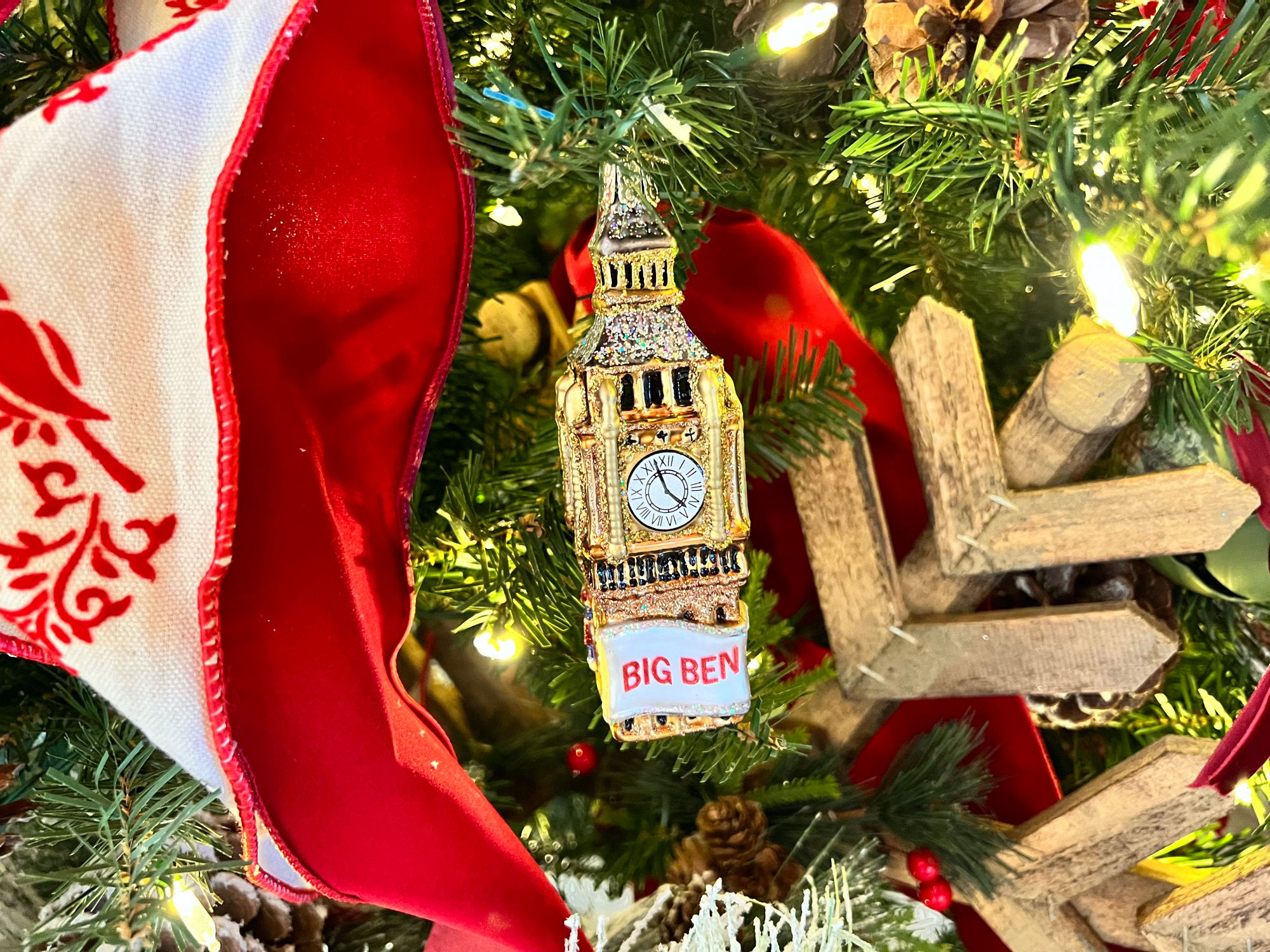
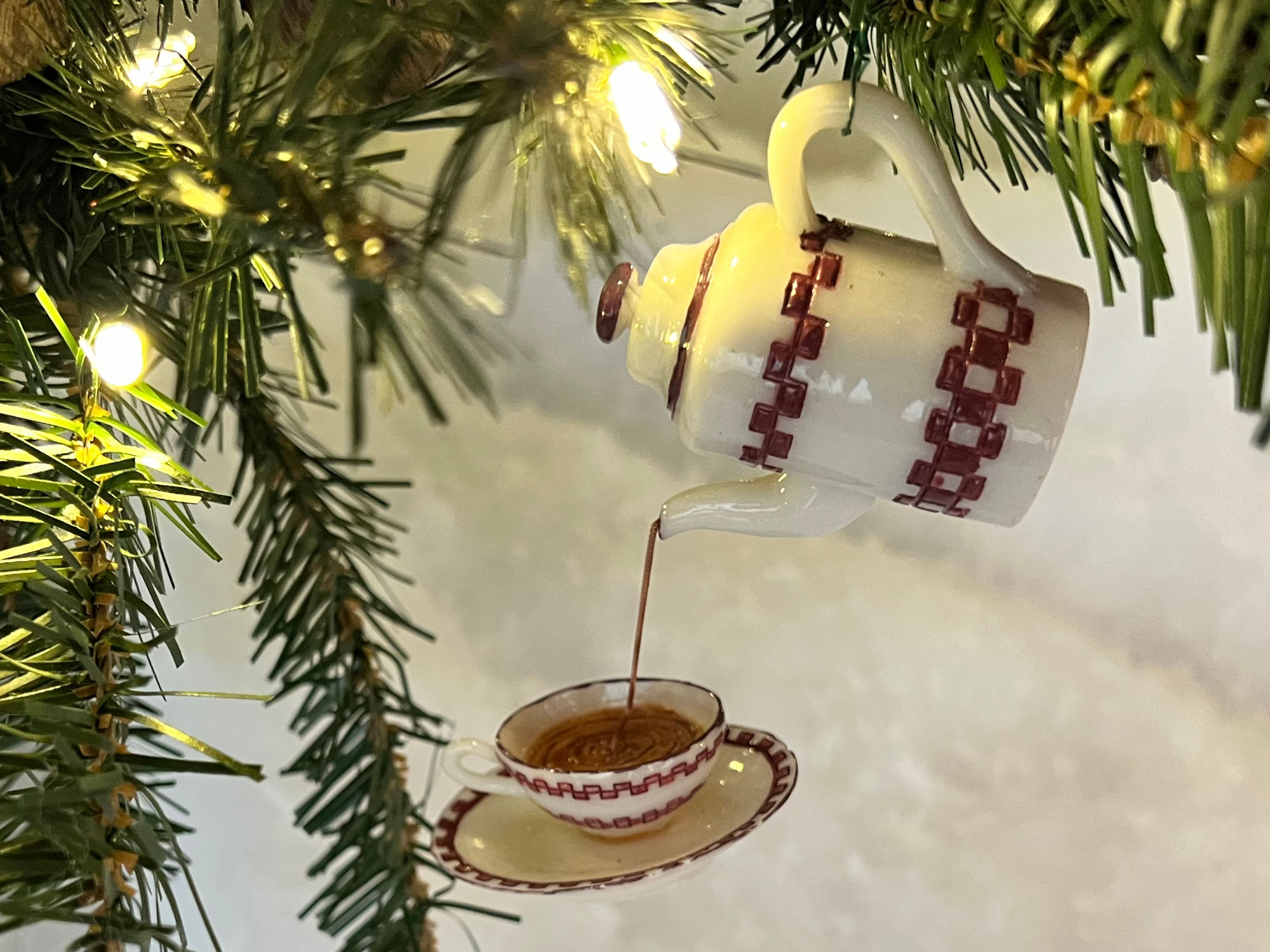
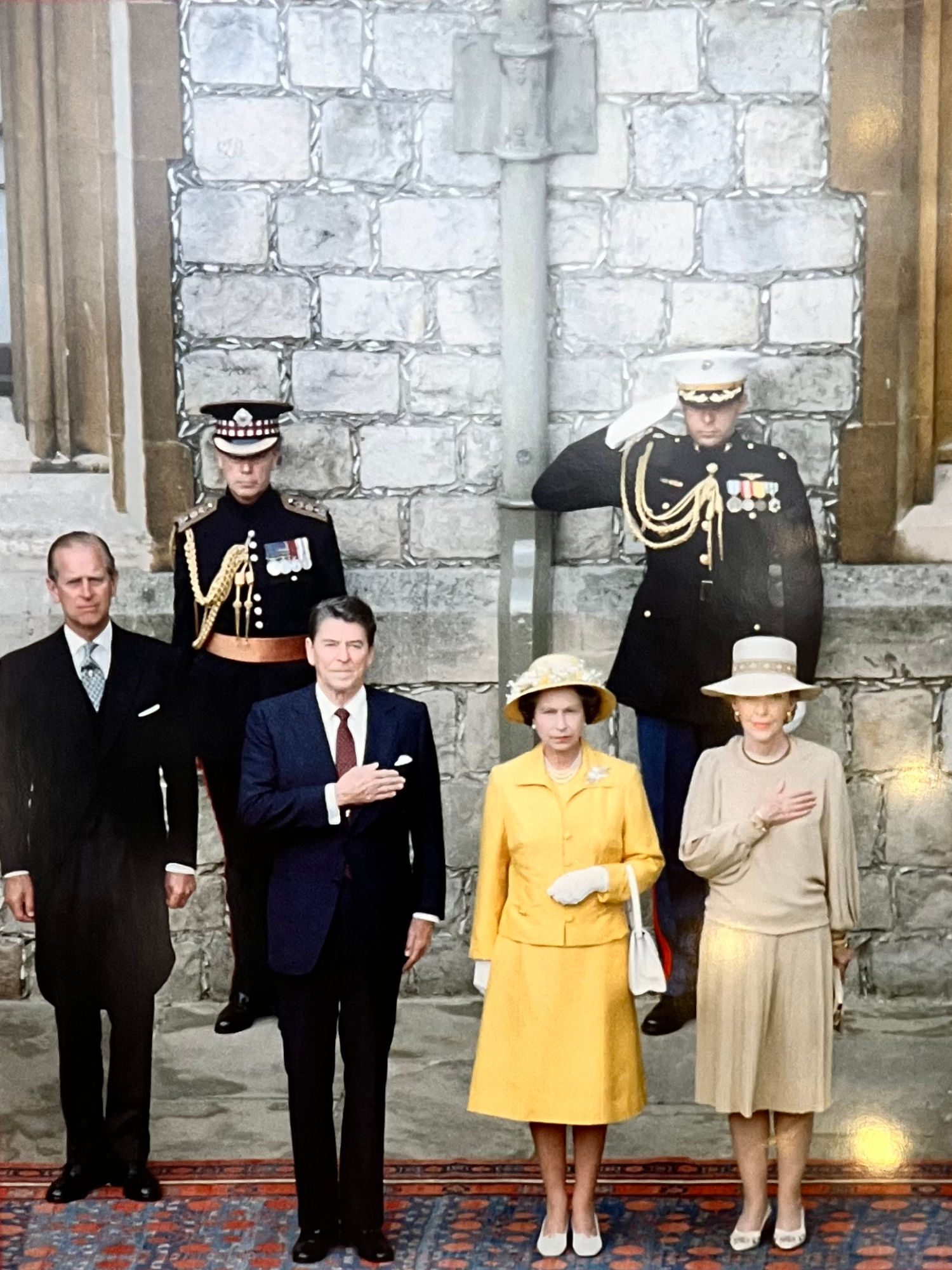
President Reagan and Nancy Reagan stand at attention with Prince Philip and Queen Elizabeth II at Windsor Castle.
Reagan's Daily DiaryTuesday, June 8, 1982
We flew out Wed. morning-I was loaded with briefing books until my head was stuffed with more than I needed to know. Flying into night we arrived in Paris at near midnight their time but only 6 P.M. ours. Met by Van & Bootsie Galbraith our Ambassador plus a welcoming French group. Put up at the Ambassadors residence which is a magnificent palace built in 1840. Suddenly the W.H. looked like an ordinary residence. I had meetings the next day with P.M. Susuzki & Thatcher-plus briefings and that night-Thurs a black tie dinner for Pres. Mitterrand. Fri. visited Mayor Chirac. Every place we drove the streets were lined with friendly crowds. Left Nancy in Paris and flew to Versailles for 1st dinner with the Summit group. Sat. the plenary sessions began. There were differences over East-West trade, Global negotiations and credits to Soviet U. plus how to stabilize currency exchange rates. We more than held our own and I believe came out on top. Sundays meetings were topped with a dinner in the Hall of Mirrors-the table had to be at least 100 feet long-an unbelievably beautiful sight. Nancy had joined me. Then we were entertained by the Paris Opera & later a recital in the Palace Chapel. Up early Mon. morning and off to Rome for meeting with Pope. A group of young American priests broke into song-"America the Beautiful." Both of us were crying. Lunched with Pres. Pertini-then called on P.M. Spadolini. Met the young men (police) who had saved Gen. Dozier. Again, the streets were lined with cheering people. We were told that had never been done for any other head of state. Flew out for London & helicoptered to Windsor Castle. This was a fairy tale experience. Black tie dinner with the Queen & Prince Phillip plus family-the Queen Mother et al. The next day a ride with the Queen. Nancy & the Prince did a carriage of 4 (horses.) We then left for London-I addressed Joint session of Parliament. First Pres. ever to do so. Lunch with P.M. Thatcher then back to Windsor for a White tie dinner-almost as spectacular as Versailles-1 long table for about 150 guests. Bonn and Berlin were again a series of palaces. The N.A.T.O. meeting was a success in every way. We were housed in an old castle complete with moat. Thurs. night a dinner hosted by Pres. & Mrs. Carstens of Germany-they are very nice. Fri. to Berlin-Checkpoint Charley and a heartwarming welcome by hundreds of our mil. personnel & their familys. Final event a speech in Charlottenberg Castle gardens to 25,000 Germans waving American flags. Almost forgot-1st day in Bonn addressed the Bundastag (Parliament). It was hailed as a great success. While in Bonn learned the House had passed a budget-we’re on our way. Also learned though that Israel had invaded Lebanon. I’m afraid we are faced with a real crisis.Key Facts
- President Reagan horseback rides around Windsor Castle with Queen Elizabeth and Prince Phillip.
- President Reagan address the Joint Session of Parliament, the first U.S. President to do so.
- President Reagan meets with Prime Minister Margaret Thatcher.
RONALD REAGANAddress to Members of the British ParliamentJune 8, 1982
My Lord Chancellor, Mr. Speaker:
The journey of which this visit forms a part is a long one. Already it has taken me to two great cities of the West, Rome and Paris, and to the economic summit at Versailles. And there, once again, our sister democracies have proved that even in a time of severe economic strain, free peoples can work together freely and voluntarily to address problems as serious as inflation, unemployment, trade, and economic development in a spirit of cooperation and solidarity.
Other milestones lie ahead. Later this week, in Germany, we and our NATO allies will discuss measures for our joint defense and America's latest initiatives for a more peaceful, secure world through arms reductions.
Each stop of this trip is important, but among them all, this moment occupies a special place in my heart and in the hearts of my countrymen -- a moment of kinship and homecoming in these hallowed halls.
Speaking for all Americans, I want to say how very much at home we feel in your house. Every American would, because this is, as we have been so eloquently told, one of democracy's shrines. Here the rights of free people and the processes of representation have been debated and refined.
It has been said that an institution is the lengthening shadow of a man. This institution is the lengthening shadow of all the men and women who have sat here and all those who have voted to send representatives here.
This is my second visit to Great Britain as President of the United States. My first opportunity to stand on British soil occurred almost a year and a half ago when your Prime Minister graciously hosted a diplomatic dinner at the British Embassy in Washington. Mrs. Thatcher said then that she hoped I was not distressed to find staring down at me from the grand staircase a portrait of His Royal Majesty King George III. She suggested it was best to let bygones be bygones, and in view of our two countries' remarkable friendship in succeeding years, she added that most Englishmen today would agree with Thomas Jefferson that "a little rebellion now and then is a very good thing." [Laughter]
Well, from here I will go to Bonn and then Berlin, where there stands a grim symbol of power untamed. The Berlin Wall, that dreadful gray gash across the city, is in its third decade. It is the fitting signature of the regime that built it.
And a few hundred kilometers behind the Berlin Wall, there is another symbol. In the center of Warsaw, there is a sign that notes the distances to two capitals. In one direction it points toward Moscow. In the other it points toward Brussels, headquarters of Western Europe's tangible unity. The marker says that the distances from Warsaw to Moscow and Warsaw to Brussels are equal. The sign makes this point: Poland is not East or West. Poland is at the center of European civilization. It has contributed mightily to that civilization. It is doing so today by being magnificently unreconciled to oppression.
Poland's struggle to be Poland and to secure the basic rights we often take for granted demonstrates why we dare not take those rights for granted. Gladstone, defending the Reform Bill of 1866, declared, "You cannot fight against the future. Time is on our side." It was easier to believe in the march of democracy in Gladstone's day -- in that high noon of Victorian optimism.
We're approaching the end of a bloody century plagued by a terrible political invention -- totalitarianism. Optimism comes less easily today, not because democracy is less vigorous, but because democracy's enemies have refined their instruments of repression. Yet optimism is in order, because day by day democracy is proving itself to be a not-at-all-fragile flower. From Stettin on the Baltic to Varna on the Black Sea, the regimes planted by totalitarianism have had more than 30 years to establish their legitimacy. But none -- not one regime -- has yet been able to risk free elections. Regimes planted by bayonets do not take root.
The strength of the Solidarity movement in Poland demonstrates the truth told in an underground joke in the Soviet Union. It is that the Soviet Union would remain a one-party nation even if an opposition party were permitted, because everyone would join the opposition party. [Laughter]
America's time as a player on the stage of world history has been brief. I think understanding this fact has always made you patient with your younger cousins -- well, not always patient. I do recall that on one occasion, Sir Winston Churchill said in exasperation about one of our most distinguished diplomats: "He is the only case I know of a bull who carries his china shop with him." [Laughter]
But witty as Sir Winston was, he also had that special attribute of great statesmen -- the gift of vision, the willingness to see the future based on the experience of the past. It is this sense of history, this understanding of the past that I want to talk with you about today, for it is in remembering what we share of the past that our two nations can make common cause for the future.
We have not inherited an easy world. If developments like the Industrial Revolution, which began here in England, and the gifts of science and technology have made life much easier for us, they have also made it more dangerous. There are threats now to our freedom, indeed to our very existence, that other generations could never even have imagined.
There is first the threat of global war. No President, no Congress, no Prime Minister, no Parliament can spend a day entirely free of this threat. And I don't have to tell you that in today's world the existence of nuclear weapons could mean, if not the extinction of mankind, then surely the end of civilization as we know it. That's why negotiations on intermediate-range nuclear forces now underway in Europe and the START talks -- Strategic Arms Reduction Talks -- which will begin later this month, are not just critical to American or Western policy; they are critical to mankind. Our commitment to early success in these negotiations is firm and unshakable, and our purpose is clear: reducing the risk of war by reducing the means of waging war on both sides.
At the same time there is a threat posed to human freedom by the enormous power of the modern state. History teaches the dangers of government that overreaches -- political control taking precedence over free economic growth, secret police, mindless bureaucracy, all combining to stifle individual excellence and personal freedom.
Now, I'm aware that among us here and throughout Europe there is legitimate disagreement over the extent to which the public sector should play a role in a nation's economy and life. But on one point all of us are united -- our abhorrence of dictatorship in all its forms, but most particularly totalitarianism and the terrible inhumanities it has caused in our time -- the great purge, Auschwitz and Dachau, the Gulag, and Cambodia.
Historians looking back at our time will note the consistent restraint and peaceful intentions of the West. They will note that it was the democracies who refused to use the threat of their nuclear monopoly in the forties and early fifties for territorial or imperial gain. Had that nuclear monopoly been in the hands of the Communist world, the map of Europe -- indeed, the world -- would look very different today. And certainly they will note it was not the democracies that invaded Afghanistan or suppressed Polish Solidarity or used chemical and toxin warfare in Afghanistan and Southeast Asia.
If history teaches anything it teaches self-delusion in the face of unpleasant facts is folly. We see around us today the marks of our terrible dilemma -- predictions of doomsday, antinuclear demonstrations, an arms race in which the West must, for its own protection, be an unwilling participant. At the same time we see totalitarian forces in the world who seek subversion and conflict around the globe to further their barbarous assault on the human spirit. What, then, is our course? Must civilization perish in a hail of fiery atoms? Must freedom wither in a quiet, deadening accommodation with totalitarian evil?
Sir Winston Churchill refused to accept the inevitability of war or even that it was imminent. He said, "I do not believe that Soviet Russia desires war. What they desire is the fruits of war and the indefinite expansion of their power and doctrines. But what we have to consider here today while time remains is the permanent prevention of war and the establishment of conditions of freedom and democracy as rapidly as possible in all countries."
Well, this is precisely our mission today: to preserve freedom as well as peace. It may not be easy to see; but I believe we live now at a turning point.
In an ironic sense Karl Marx was right. We are witnessing today a great revolutionary crisis, a crisis where the demands of the economic order are conflicting directly with those of the political order. But the crisis is happening not in the free, non-Marxist West, but in the home of Marxist-Leninism, the Soviet Union. It is the Soviet Union that runs against the tide of history by denying human freedom and human dignity to its citizens. It also is in deep economic difficulty. The rate of growth in the national product has been steadily declining since the fifties and is less than half of what it was then.
The dimensions of this failure are astounding: A country which employs one-fifth of its population in agriculture is unable to feed its own people. Were it not for the private sector, the tiny private sector tolerated in Soviet agriculture, the country might be on the brink of famine. These private plots occupy a bare 3 percent of the arable land but account for nearly one-quarter of Soviet farm output and nearly one-third of meat products and vegetables. Overcentralized, with little or no incentives, year after year the Soviet system pours its best resource into the making of instruments of destruction. The constant shrinkage of economic growth combined with the growth of military production is putting a heavy strain on the Soviet people. What we see here is a political structure that no longer corresponds to its economic base, a society where productive forces are hampered by political ones.
The decay of the Soviet experiment should come as no surprise to us. Wherever the comparisons have been made between free and closed societies -- West Germany and East Germany, Austria and Czechoslovakia, Malaysia and Vietnam -- it is the democratic countries what are prosperous and responsive to the needs of their people. And one of the simple but overwhelming facts of our time is this: Of all the millions of refugees we've seen in the modern world, their flight is always away from, not toward the Communist world. Today on the NATO line, our military forces face east to prevent a possible invasion. On the other side of the line, the Soviet forces also face east to prevent their people from leaving.
The hard evidence of totalitarian rule has caused in mankind an uprising of the intellect and will. Whether it is the growth of the new schools of economics in America or England or the appearance of the so-called new philosophers in France, there is one unifying thread running through the intellectual work of these groups -- rejection of the arbitrary power of the state, the refusal to subordinate the rights of the individual to the superstate, the realization that collectivism stifles all the best human impulses.
Since the exodus from Egypt, historians have written of those who sacrificed and struggled for freedom -- the stand at Thermopylae, the revolt of Spartacus, the storming of the Bastille, the Warsaw uprising in World War II. More recently we've seen evidence of this same human impulse in one of the developing nations in Central America. For months and months the world news media covered the fighting in El Salvador. Day after day we were treated to stories and film slanted toward the brave freedom-fighters battling oppressive government forces in behalf of the silent, suffering people of that tortured country.
And then one day those silent, suffering people were offered a chance to vote, to choose the kind of government they wanted. Suddenly the freedom-fighters in the hills were exposed for what they really are -- Cuban-backed guerrillas who want power for themselves, and their backers, not democracy for the people. They threatened death to any who voted, and destroyed hundreds of buses and trucks to keep the people from getting to the polling places. But on election day, the people of El Salvador, an unprecedented 1.4 million of them, braved ambush and gunfire, and trudged for miles to vote for freedom.
They stood for hours in the hot sun waiting for their turn to vote. Members of our Congress who went there as observers told me of a women who was wounded by rifle fire on the way to the polls, who refused to leave the line to have her wound treated until after she had voted. A grandmother, who had been told by the guerrillas she would be killed when she returned from the polls, and she told the guerrillas, "You can kill me, you can kill my family, kill my neighbors, but you can't kill us all." The real freedom-fighters of El Salvador turned out to be the people of that country -- the young, the old, the in-between.
Strange, but in my own country there's been little if any news coverage of that war since the election. Now, perhaps they'll say it's -- well, because there are newer struggles now.
On distant islands in the South Atlantic young men are fighting for Britain. And, yes, voices have been raised protesting their sacrifice for lumps of rock and earth so far away. But those young men aren't fighting for mere real estate. They fight for a cause -- for the belief that armed aggression must not be allowed to succeed, and the people must participate in the decisions of government -- [applause] -- the decisions of government under the rule of law. If there had been firmer support for that principle some 45 years ago, perhaps our generation wouldn't have suffered the bloodletting of World War II.
In the Middle East now the guns sound once more, this time in Lebanon, a country that for too long has had to endure the tragedy of civil war, terrorism, and foreign intervention and occupation. The fighting in Lebanon on the part of all parties must stop, and Israel should bring its forces home. But this is not enough. We must all work to stamp out the scourge of terrorism that in the Middle East makes war an ever-present threat.
But beyond the trouble spots lies a deeper, more positive pattern. Around the world today, the democratic revolution is gathering new strength. In India a critical test has been passed with the peaceful change of governing political parties. In Africa, Nigeria is moving into remarkable and unmistakable ways to build and strengthen its democratic institutions. In the Caribbean and Central America, 16 of 24 countries have freely elected governments. And in the United Nations, 8 of the 10 developing nations which have joined that body in the past 5 years are democracies.
In the Communist world as well, man's instinctive desire for freedom and self-determination surfaces again and again. To be sure, there are grim reminders of how brutally the police state attempts to snuff out this quest for self-rule -- 1953 in East Germany, 1956 in Hungary, 1968 in Czechoslovakia, 1981 in Poland. But the struggle continues in Poland. And we know that there are even those who strive and suffer for freedom within the confines of the Soviet Union itself. How we conduct ourselves here in the Western democracies will determine whether this trend continues.
No, democracy is not a fragile flower. Still it needs cultivating. If the rest of this century is to witness the gradual growth of freedom and democratic ideals, we must take actions to assist the campaign for democracy.
Some argue that we should encourage democratic change in right-wing dictatorships, but not in Communist regimes. Well, to accept this preposterous notion -- as some well-meaning people have -- is to invite the argument that once countries achieve a nuclear capability, they should be allowed an undisturbed reign of terror over their own citizens. We reject this course.
As for the Soviet view, Chairman Brezhnev repeatedly has stressed that the competition of ideas and systems must continue and that this is entirely consistent with relaxation of tensions and peace.
Well, we ask only that these systems begin by living up to their own constitutions, abiding by their own laws, and complying with the international obligations they have undertaken. We ask only for a process, a direction, a basic code of decency, not for an instant transformation.
We cannot ignore the fact that even without our encouragement there has been and will continue to be repeated explosions against repression and dictatorships. The Soviet Union itself is not immune to this reality. Any system is inherently unstable that has no peaceful means to legitimize its leaders. In such cases, the very repressiveness of the state ultimately drives people to resist it, if necessary, by force.
While we must be cautious about forcing the pace of change, we must not hesitate to declare our ultimate objectives and to take concrete actions to move toward them. We must be staunch in our conviction that freedom is not the sole prerogative of a lucky few, but the inalienable and universal right of all human beings. So states the United Nations Universal Declaration of Human Rights, which, among other things, guarantees free elections.
The objective I propose is quite simple to state: to foster the infrastructure of democracy, the system of a free press, unions, political parties, universities, which allows a people to choose their own way to develop their own culture, to reconcile their own differences through peaceful means.
This is not cultural imperialism, it is providing the means for genuine self-determination and protection for diversity. Democracy already flourishes in countries with very different cultures and historical experiences. It would be cultural condescension, or worse, to say that any people prefer dictatorship to democracy. Who would voluntarily choose not to have the right to vote, decide to purchase government propaganda handouts instead of independent newspapers, prefer government to worker-controlled unions, opt for land to be owned by the state instead of those who till it, want government repression of religious liberty, a single political party instead of a free choice, a rigid cultural orthodoxy instead of democratic tolerance and diversity?
Since 1917 the Soviet Union has given covert political training and assistance to Marxist-Leninists in many countries. Of course, it also has promoted the use of violence and subversion by these same forces. Over the past several decades, West European and other Social Democrats, Christian Democrats, and leaders have offered open assistance to fraternal, political, and social institutions to bring about peaceful and democratic progress. Appropriately, for a vigorous new democracy, the Federal Republic of Germany's political foundations have become a major force in this effort.
We in America now intend to take additional steps, as many of our allies have already done, toward realizing this same goal. The chairmen and other leaders of the national Republican and Democratic Party organizations are initiating a study with the bipartisan American political foundation to determine how the United States can best contribute as a nation to the global campaign for democracy now gathering force. They will have the cooperation of congressional leaders of both parties, along with representatives of business, labor, and other major institutions in our society. I look forward to receiving their recommendations and to working with these institutions and the Congress in the common task of strengthening democracy throughout the world.
It is time that we committed ourselves as a nation -- in both the pubic and private sectors -- to assisting democratic development.
We plan to consult with leaders of other nations as well. There is a proposal before the Council of Europe to invite parliamentarians from democratic countries to a meeting next year in Strasbourg. That prestigious gathering could consider ways to help democratic political movements.
This November in Washington there will take place an international meeting on free elections. And next spring there will be a conference of world authorities on constitutionalism and self-goverment hosted by the Chief Justice of the United States. Authorities from a number of developing and developed countries -- judges, philosophers, and politicians with practical experience -- have agreed to explore how to turn principle into practice and further the rule of law.
At the same time, we invite the Soviet Union to consider with us how the competition of ideas and values -- which it is committed to support -- can be conducted on a peaceful and reciprocal basis. For example, I am prepared to offer President Brezhnev an opportunity to speak to the American people on our television if he will allow me the same opportunity with the Soviet people. We also suggest that panels of our newsmen periodically appear on each other's television to discuss major events.
Now, I don't wish to sound overly optimistic, yet the Soviet Union is not immune from the reality of what is going on in the world. It has happened in the past -- a small ruling elite either mistakenly attempts to ease domestic unrest through greater repression and foreign adventure, or it chooses a wiser course. It begins to allow its people a voice in their own destiny. Even if this latter process is not realized soon, I believe the renewed strength of the democratic movement, complemented by a global campaign for freedom, will strengthen the prospects for arms control and a world at peace.
I have discussed on other occasions, including my address on May 9th, the elements of Western policies toward the Soviet Union to safeguard our interests and protect the peace. What I am describing now is a plan and a hope for the long term -- the march of freedom and democracy which will leave Marxism-Leninism on the ash-heap of history as it has left other tyrannies which stifle the freedom and muzzle the self-expression of the people. And that's why we must continue our efforts to strengthen NATO even as we move forward with our Zero-Option initiative in the negotiations on intermediate-range forces and our proposal for a one-third reduction in strategic ballistic missile warheads.
Our military strength is a prerequisite to peace, but let it be clear we maintain this strength in the hope it will never be used, for the ultimate determinant in the struggle that's now going on in the world will not be bombs and rockets, but a test of wills and ideas, a trial of spiritual resolve, the values we hold, the beliefs we cherish, the ideals to which we are dedicated.
The British people know that, given strong leadership, time and a little bit of hope, the forces of good ultimately rally and triumph over evil. Here among you is the cradle of self-government, the Mother of Parliaments. Here is the enduring greatness of the British contribution to mankind, the great civilized ideas: individual liberty, representative government, and the rule of law under God.
I've often wondered about the shyness of some of us in the West about standing for these ideals that have done so much to ease the plight of man and the hardships of our imperfect world. This reluctance to use those vast resources at our command reminds me of the elderly lady whose home was bombed in the Blitz. As the rescuers moved about, they found a bottle of brandy she'd stored behind the staircase, which was all that was left standing. And since she was barely conscious, one of the workers pulled the cork to give her a taste of it. She came around immediately and said, "Here now -- there now, put it back. That's for emergencies." [Laughter]
Well, the emergency is upon us. Let us be shy no longer. Let us go to our strength. Let us offer hope. Let us tell the world that a new age is not only possible but probable.
During the dark days of the Second World War, when this island was incandescent with courage, Winston Churchill exclaimed about Britain's adversaries, "What kind of a people do they think we are?" Well, Britain's adversaries found out what extraordinary people the British are. But all the democracies paid a terrible price for allowing the dictators to underestimate us. We dare not make that mistake again. So, let us ask ourselves, "What kind of people do we think we are?" And let us answer, "Free people, worthy of freedom and determined not only to remain so but to help others gain their freedom as well."
Sir Winston led his people to great victory in war and then lost an election just as the fruits of victory were about to be enjoyed. But he left office honorably, and, as it turned out, temporarily, knowing that the liberty of his people was more important than the fate of any single leader. History recalls his greatness in ways no dictator will ever know. And he left us a message of hope for the future, as timely now as when he first uttered it, as opposition leader in the Commons nearly 27 years ago, when he said, "When we look back on all the perils through which we have passed and at the mighty foes that we have laid low and all the dark and deadly designs that we have frustrated, why should we fear for our future? We have," he said, "come safely through the worst."
Well, the task I've set forth will long outlive our own generation. But together, we too have come through the worst. Let us now begin a major effort to secure the best -- a crusade for freedom that will engage the faith and fortitude of the next generation. For the sake of peace and justice, let us move toward a world in which all people are at last free to determine their own destiny.
Thank you.
NOTEThe President spoke at 12:14 p.m. in the Royal Gallery at the Palace of Westminster in London.On the previous evening, the President was greeted by Queen Elizabeth II in an arrival ceremony at Windsor Castle, near Windsor, England. Later, the Queen hosted a private dinner for the President.
On the morning of June 8, the President and the Queen spent part of the morning horseback riding on the Windsor Castle grounds.
WIKIPEDIAThe United Kingdom of Great Britain and Northern Ireland
BritainA country in Northwestern Europe, off the north-western coast of the continental mainland. It comprises England, Scotland, Wales, and Northern Ireland. It includes the island of Great Britain, the north-eastern part of the island of Ireland, and most of the smaller islands within the British Isles. Northern Ireland shares a land border with the Republic of Ireland; otherwise, the United Kingdom is surrounded by the Atlantic Ocean, the North Sea, the English Channel, the Celtic Sea and the Irish Sea. The total area of the United Kingdom is 93,628 square miles, with an estimated 2022 population of nearly 67 million people.The United Kingdom has evolved from a series of annexations, unions and separations of constituent countries over several hundred years. The Treaty of Union between the Kingdom of England (which included Wales) and the Kingdom of Scotland in 1707 resulted in their unification to become the Kingdom of Great Britain. Its union in 1801 with the Kingdom of Ireland created the United Kingdom of Great Britain and Ireland. Most of Ireland seceded from the UK in 1922, leaving the present United Kingdom of Great Britain and Northern Ireland, which formally adopted its name in 1927. The nearby Isle of Man, Guernsey and Jersey are not part of the UK, being Crown Dependencies, but the British government is responsible for their defence and international representation.
United KingdomCountries within a Country
Although the United Kingdom is a sovereign country, England, Scotland, Wales, and Northern Ireland are also widely referred to as countries. The UK Prime Minister's website has used the phrase "countries within a country" to describe the United Kingdom.
- The term "Great Britain" conventionally refers to the island of Great Britain, or politically to England, Scotland and Wales in combination. It is sometimes used as a loose synonym for the United Kingdom as a whole. The word England is occasionally used incorrectly to refer to the United Kingdom as a whole, a mistake principally made by people from outside the UK.
- The term "Britain" is used as a synonym for Great Britain, and the United Kingdom. Usage is mixed: the UK Government prefers to use the term "UK" rather than "Britain" or "British" on its website (except when referring to embassies).
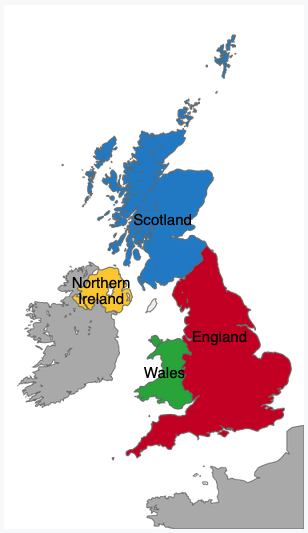
- The UK has 4 Countries with 84% of the population in England
- England 56,489,800. Local government in England is complex, with the distribution of functions varying according to local arrangements. Greater London, has had a directly elected assembly and mayor since 2000.
- Scotland 5,436,600. Since 1999, Scotland has had a devolved national government and legislature called the Scottish Parliament.
- Wales 3,267,501. Since 1999, Wales has a devolved national government and legislature, known as the Senedd.
- Northern Ireland 1,903,100. Since 1998, Northern Ireland has a devolved government, the Executive, and legislature, the Assembly.
- The United Kingdom, the 14 British Overseas Territories and the three Crown Dependencies form 'one undivided Realm'. All parts of the realm are under the sovereignty of the British Crown, but the Territories and Dependencies are not part of the UK.
- The 14 British Overseas Territories are remnants of the British Empire: Anguilla; Bermuda; the British Antarctic Territory; the British Indian Ocean Territory; the British Virgin Islands; the Cayman Islands; the Falkland Islands; Gibraltar; Montserrat; Saint Helena, Ascension and Tristan da Cunha; the Turks and Caicos Islands; the Pitcairn Islands; South Georgia and the South Sandwich Islands; and Akrotiri and Dhekelia on the island of Cyprus. British claims in Antarctica have limited international recognition. Collectively Britain's overseas territories encompass an approximate land area of 480,000 square nautical miles with a total population of approximately 250,000. The overseas territories also give the UK the world's fifth largest exclusive economic zone at 2,627,651 sq miles.
- The Crown Dependencies are possessions of the Crown, as opposed to territories of the UK. They comprise three independently administered jurisdictions: the Bailiwicks of Jersey and of Guernsey in the English Channel, and the Isle of Man in the Irish Sea. By mutual agreement, the British Government manages the islands' foreign affairs and defense and the UK Parliament has the authority to legislate on their behalf. Internationally, they are regarded as "territories for which the United Kingdom is responsible".
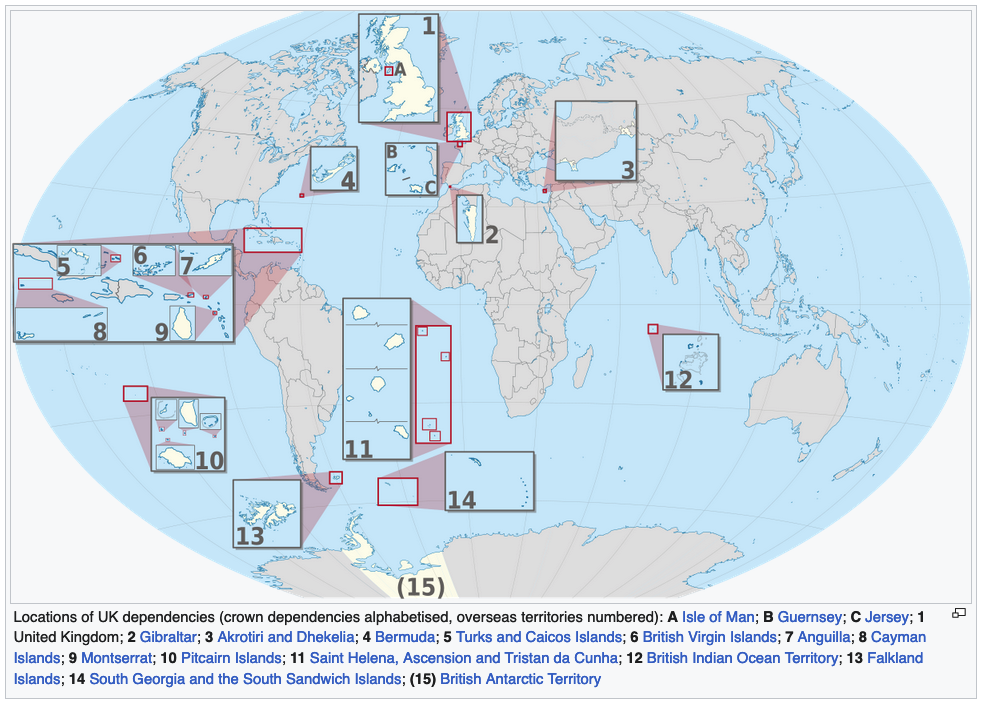
- The UK became the first industrialized country and was the world's foremost power for the majority of the 19th and early 20th centuries, particularly during the "Pax Britannica" between 1815 and 1914.
- The British Empire, at its height in the 1920s, encompassed almost a quarter of the world's landmass and population, and was the largest empire in history; however, its involvement in the First World War and the Second World War damaged Britain's economic power and a global wave of decolonization led to the independence of most British colonies.
- British influence can be observed in the legal and political systems of many of its former colonies, and the UK's culture remains globally influential, particularly in literature, music and sport.
- The United Kingdom is a constitutional monarchy and parliamentary democracy.
- The capital and largest city of the United Kingdom (as well as the capital of England) is London. The cities of Edinburgh, Cardiff, and Belfast are respectively the national capitals of Scotland, Wales, and Northern Ireland. Other major cities include Birmingham, Manchester, Glasgow, and Leeds.
- The UK consists of three distinct legal jurisdictions: England and Wales, Scotland, and Northern Ireland. This is due to these areas retaining their existing legal systems even after joining the UK. Since 1998, Scotland, Wales, and Northern Ireland also have their own devolved governments and legislatures, each with varying powers.
- The UK has the world's sixth-largest economy by nominal gross domestic product (GDP), and the ninth-largest by purchasing power parity.
- It is a recognized nuclear state and is ranked fourth globally in military expenditure.
- The UK has been a permanent member of the UN Security Council since its first session in 1946. It is a member of the Commonwealth of Nations, the Council of Europe, the G7, the OECD, NATO, the Five Eyes, AUKUS and the CPTPP.
- Stonehenge in Wiltshire is a ring of stones, each about 13 feet high, 7 feet wide and 25 tonnes, erected 2400–2200 BC.
- Most of the United Kingdom has a temperate climate, with generally cool temperatures and plentiful rainfall all year round. The temperature varies with the seasons seldom dropping below 32 F or rising above 86 F.
- His Majesty's Armed Forces consist of three professional service branches: the Royal Navy and Royal Marines (forming the Naval Service), the British Army and the Royal Air Force.
- The UK has a partially regulated market economy. Based on market exchange rates, the UK is the sixth-largest economy in the world and the second-largest in Europe by nominal GDP. The United Kingdom uses the pound sterling, currently the fourth most-traded currency in the foreign exchange market and the world's fourth-largest reserve currency (after the United States dollar, euro, and yen). The service sector made up around 80% of the UK's GVA in 2021. As of 2022, the UK is the world's second-largest exporter of services. London is one of the world's largest financial centers, ranking second in the world in the Global Financial Centers Index in 2022. London also has the largest city GDP in Europe.
- The automotive industry employs around 800,000 people. In 2022, the UK produced around 775,000 passenger vehicles and 101,600 commercial vehicles, including luxury cars such as Rolls-Royce, Bentley and Range Rover.
- The United Kingdom has among the highest levels of income inequality in Europe and the OECD, and is one of the most regionally unequal high-income countries in the world.
- England and Scotland were leading centers of the Scientific Revolution from the 17th century. The United Kingdom led the Industrial Revolution from the 18th century, and has continued to produce scientists and engineers credited with important advances. Major theorists from the 17th and 18th centuries include Isaac Newton, whose laws of motion and illumination of gravity have been seen as a keystone of modern science; from the 19th century Charles Darwin, whose theory of evolution by natural selection was fundamental to the development of modern biology, and James Clerk Maxwell, who formulated classical electromagnetic theory; and more recently Stephen Hawking, who advanced major theories in the fields of cosmology, quantum gravity and the investigation of black holes.
- London Heathrow Airport, located 15 miles (24 km) west of the capital, is the world's second busiest airport by international passenger traffic and has the most international passenger traffic of any airport in the world; it is the hub for the UK flag carrier British Airways, as well as Virgin Atlantic.
- In the 2011 census the total population of the United Kingdom was 63,181,775. It is the fourth-largest in Europe (after Russia, Germany and France).
- Historically, indigenous British people were thought to be descended from the various ethnic groups that settled there before the 12th century: the Celts, Romans, Anglo-Saxons, Norse and the Normans. Welsh people could be the oldest ethnic group in the UK. The UK has a history of non-white immigration with Liverpool having the oldest Black population in the country dating back to at least the 1730s during the period of the African slave trade. The UK also has the oldest Chinese community in Europe, dating to the arrival of Chinese seamen in the 19th century. In 2011, 87.2 per cent of the UK population identified themselves as white, meaning 12.8 per cent of the UK population identify themselves as of one of an ethnic minority group.
- The English language is the official and most spoken language of the United Kingdom that originated from England. Three indigenous Celtic languages are spoken in the UK: Welsh, Irish and Scottish Gaelic. Cornish, which became extinct as a first language in the late 18th century, is subject to revival efforts and has a small group of second language speakers.
- Forms of Christianity have dominated religious life in what is now the United Kingdom for more than 1,400 years.
- Most British literature is in English. In 2005, some 206,000 books were published in the United Kingdom and in 2006 it was the largest publisher of books in the world. The English playwright and poet William Shakespeare is widely regarded as the greatest dramatist of all time. The 20th-century English crime writer Agatha Christie is the best-selling novelist of all time.
- Scotland's literature contributions include Arthur Conan Doyle (the creator of Sherlock Holmes), Sir Walter Scott, J. M. Barrie, Robert Louis Stevenson and the poet Robert Burns.
- Welsh literature includes Britain's oldest known poem, Y Gododdin [https://en.wikipedia.org/wiki/Y_Gododdin], which was composed most likely in the late 6th century. It was written in Cumbric or Old Welsh and contains the earliest known reference to King Arthur.
- Irish writers, living at a time when all of Ireland was part of the United Kingdom, include Oscar Wilde, Bram Stoker and George Bernard Shaw.
- The Beatles have international sales of over 1 billion units and are the biggest-selling and most influential band in the history of popular music. Other prominent British contributors to have influenced popular music over the last 50 years include the Rolling Stones, Pink Floyd, Queen, Led Zeppelin, the Bee Gees, and Elton John. The Who, David Bowie, Eric Clapton, Rod Stewart, the Police, and Fleetwood Mac (who are a British-American band). More recent UK music acts that have had international success include George Michael, Oasis, Spice Girls, Radiohead, Coldplay, Arctic Monkeys, Robbie Williams, Amy Winehouse, Susan Boyle, Adele, Ed Sheeran, Lewis Capaldi, One Direction and Harry Styles.
- The United Kingdom has had a considerable influence on the history of the cinema. The British directors Alfred Hitchcock, whose film Vertigo is considered by some critics as the best film of all time, and David Lean are among the most critically acclaimed of all time. Many British actors have achieved international fame and critical success. Some of the most commercially successful films of all time have been produced in the United Kingdom, including two of the highest-grossing film franchises (Harry Potter and James Bond).
- Afternoon tea is a light afternoon meal served with tea in tea rooms and hotels around the United Kingdom, with the tradition dating back to around 1840. A 2019 YouGov poll rated classic British food, the following had more than 80% of people like them who had tried them: Sunday roast, Yorkshire pudding, Fish and chips, Crumpets, and Full English breakfast. Sweet foods are common within British cuisine, and there is a long list of British desserts.
- The BBC, founded in 1922, is the UK's publicly funded radio, television and Internet broadcasting corporation, and is the oldest and largest broadcaster in the world.
- Association football, tennis, table tennis, badminton, rugby union, rugby league, rugby sevens, golf, boxing, netball, water polo, field hockey, billiards, darts, rowing, rounders and cricket originated or were substantially developed in the UK, with the rules and codes of many modern sports invented and codified in late 19th-century Victorian Britain. Football is the most popular sport in the UK. England is recognized by FIFA as the birthplace of club football, and the Football Association is the oldest of its kind, with the rules of football first drafted in 1863 by Ebenezer Cobb Morley. Rugby union was ranked the second most popular sport in the UK. The United Kingdom hosted the Summer Olympic Games in 1908, 1948 and 2012, with London acting as the host city on all three occasions.
The flag of the United Kingdom is the Union Flag (also referred to as the Union Jack). It was created in 1606 by the superimposition of the flag of England, representing Saint George, on the flag of Scotland, representing Saint Andrew, and was updated in 1801 with the addition of Saint Patrick's Flag. Wales is not represented in the Union Flag, as Wales had been conquered and annexed to England prior to the formation of the United Kingdom. England, Wales, and Scotland each have a number of their own national symbols, including their national flags. Northern Ireland also has a number of symbols, many of which are shared with Republic of Ireland.
EtymologyIn 43 AD, Britannia referred to the Roman province that encompassed modern England and Wales. Great Britain encompassed the whole island, taking in the land north of the River Forth known to the Romans as Caledonia in modern Scotland (i.e. "greater" Britain). In the Middle Ages, the name "Britain" was also applied to a small part of France now known as Brittany. As a result, Great Britain (likely from the French "Grande Bretagne") came into use to refer specifically to the island, with Brittany often referred to as "Little Britain". However, that name had no official significance until 1707, when the island's kingdoms of England and Scotland were united as the Kingdom of Great Britain.
